Lona Manning's Blog, page 15
June 12, 2022
CMP#106 Julia Marchmont, the Suffering Heroine
 “Have you among your story books Mrs. Woodlands Tales, let me my dear child recommend them to you.”
“Have you among your story books Mrs. Woodlands Tales, let me my dear child recommend them to you.”-- Southern gentlewoman Mary Telfair, in a letter to a friend, 1827 CMP#106 Julia Marchmont, the Suffering Heroine
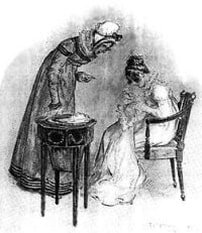 Family harmony In the
previous posts
I introduced a discussion about the “bear and forbear” heroine, a girl who endures mistreatment without resentment. However far such portraits of girls strayed from reality, there is no doubt that heroines of this sort were held up as models to emulate. Bear and Forbear or, the history of Julia Marchmont (1809), shows us just how far an author can carry the moral lesson for young people--to the brink of death, in fact.
Family harmony In the
previous posts
I introduced a discussion about the “bear and forbear” heroine, a girl who endures mistreatment without resentment. However far such portraits of girls strayed from reality, there is no doubt that heroines of this sort were held up as models to emulate. Bear and Forbear or, the history of Julia Marchmont (1809), shows us just how far an author can carry the moral lesson for young people--to the brink of death, in fact. This book, and others, argued that being yielding and sweet-tempered is not only the best course for society and for your family, but also for you. Conduct books suggested that you would have more influence over your husband if you were sweet-tempered and obliging, not cross and demanding. In the opening of Bear and Forbear, we have this advice: “Nothing is more conducive to female happiness, or more certain to insure the affection of those with whom we live, than a yielding forbearing temper. It not only produces that harmony which is so desirable in families, but teaches fortitude and patience; two qualities which cannot be too highly estimated, and which young women cannot too assiduously cultivate.”
Speaking of family harmony, this is the reason Edmund Bertram gives for giving up his attempts to persuade his brother and sisters to abandon the private theatricals: “Family squabbling is the greatest evil of all, and we had better do anything than be altogether by the ears.” We might object that continually biting one’s tongue, or suffering, as Fanny Price does, under the tongue lashes of her Aunt Norris, is not exactly what anyone should call family “harmony."...
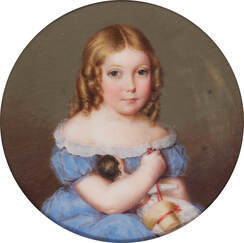 Fanny Arlaud, Portrait of a Young Girl Furthermore, the didactic novels stress that these traits of forbearance should be a matter of principle and the result of conscious conviction.
Fanny Arlaud, Portrait of a Young Girl Furthermore, the didactic novels stress that these traits of forbearance should be a matter of principle and the result of conscious conviction.In The Denial, or the Happy Retreat (1792), the tyrannical Lord Wilton is impatient and dismissive of his wife and their marriage is loveless. Lady Wilton “for many years, under patience and humility, [bore] with meekness the insulting tone of obstinacy… She vainly hoped, that such gentle and endearing behaviour would in time soften and meliorate a disposition long known to be callous and obdurate… She has hitherto failed; yet she still perseveres, from her high sense of duty… This does not proceed from passiveness, timidity, want of resolution, or defect of understanding, but from the purest of all motives, a wish to preserve domestic peace and tranquility.”
Likewise, in Bear and Forbear, we are told that “Julia Marchmont… had acquired what is most engaging in woman, a yielding temper and a spirit of forbearance, which being regulated by an excellent understanding, did not degenerate into weakness.”
Julia comes from a respectable middle-class family. The focus in the opening section of the book is on the education Julia receives from her parents. Unlike the Bertram girls in Mansfield Park, she receives a good moral education and learns habits of self-command. The author contrasts her with her spoilt little cousin Maude and Maude's weak and indulgent mother. Maude, weakened by the rich and improper diet she's allowed to eat, dies of the measles.
At eighteen, Julia is accomplished, sweet-tempered, vivacious, and intelligent. She has the good luck to captivate a baronet, Sir Owen Fitz-Ellard, who, we are told, is intelligent and benevolent, though "of an impatient temper."
As she begins her married life, Julia’s father advises her: “The wife who values her husband’s or her own happiness will always keep this in her recollection; she will bear and forbear! And such a wife acquires a lasting empire over the mind of her husband, and sets a bright example to her sex.” Dad adds that Sir Owen “is an excellent man” who “has an irascible, but not a stern or despotic temper. Soothe his moments of impatience with that gentleness so lovely in your sex, particularly in a wife….”
After the honeymoon, Sir Owen’s imperious old grandmother summons him to keep her company at “Lewellen Castle” in Wales. Just as an aside here, in novels of the long eighteenth century, Wales is an exotic destination and its inhabitants are strange and uncouth. I think the reason the author chose Wales for the story is to set up a scenario where Julia goes far, far, away from her parents to the back of beyond. This isolation helps to set up the story of her sufferings.
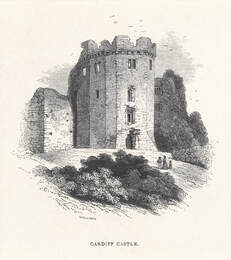 Exotic, foreign, Wales Spoilers Follow
Exotic, foreign, Wales Spoilers FollowGrandma is something of a Lady Catherine De Burgh. She thinks her grandson married beneath him, and it’s uphill work for Julia to win the old lady over: “the dowager viewed her with ill-will, amounting almost to dislike... she must expect to meet continual mortification while she remained at Lewellen Castle.” But Julia resolves not to complain to her husband or to her own parents by letter, and behaves respectfully toward the old lady. Julia did not “wish to create the slightest dispute or coldness between her beloved husband and his family.”
Julia is gradually winning over the dowager’s good opinion, when some cynical snobbish, cousins of Sir Owen, a brother and sister, come for a long visit. They are curious about the new bride: Sir Tudor is offended that Sir Owen did not marry his sister Jessica: “What! prefer a girl who in beauty, birth, and even fortune, was inferior to his sister? Prefer the alliance of plain Mr. Marchmont to that of Sir Tudor Fitz-Ellard his own relation, and whose family was at least equally ancient? The insult was scarcely to be forgiven! The girl must have been an artful creature, who had inveigled the baronet into marriage; and she would soon, no doubt, give him cause to repent.”
The cousinly brother and sister succeed in planting suspicions into the mind of Sir Owen (because he is an idiot.) Sir Owen accuses her of not liking his relatives, but she does not explain that the reason she avoids their company is because they insult her whenever they get the chance. She meekly takes his criticism and promises to “pay them more attention than ever she had done.”
Julia “suffered cruelly in secret” but “very prudently forbore to confide her sorrows even to her beloved parents; for they had taught her to feel, that nothing is so odious in a wife, as to make her domestic vexations or the faults of her husband the theme of complaint; nor is any thing so destructive to her happiness.”
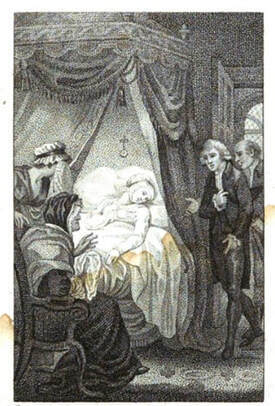 Bear and Forbear, frontispiece We learn that Sir Owen had a first love, Agnes, who died at 17, and he has a little toothpick case she gave him. One day, he realizes he can't find it and the cousins maliciously suggest that Julia has stolen it.
Bear and Forbear, frontispiece We learn that Sir Owen had a first love, Agnes, who died at 17, and he has a little toothpick case she gave him. One day, he realizes he can't find it and the cousins maliciously suggest that Julia has stolen it.“I declare, cousin,” said Jessica, affecting to smile, “If Lady Fitz-Owen were not so sensible a woman, and so sweet tempered, I should really be inclined to think she was jealous, and had purposely hid the toothpick case, to punish you for being so attached to the memory of the amiable Agnes.”
Sir Owen (who, let's remember, is an idiot and a jerk), “began to think that partiality had hitherto made him blind to the faults of his wife… he now believed that she had taken the toothpick-case. That meekness and yielding sweetness which he had before so warmly admired in Julia, now, through the liberal insinuations of Sir Tudor, appeared to him suspicious, and to be the result of art.”
Sir Owen angrily accuses Julia of being manipulative. “Facts speak for themselves, madam; whether you are jealous or not, you have behaved so as to make yourself and me ridiculous. You must have taken the trinket… You have, with all your affected meekness, played the tyrant too long; you have turned me which way you pleased; but my eyes are now opened…”
In high dudgeon, Sir Owen takes himself off to London to look after some business, leaving Julia with his horrible relatives. “[A]ll she could do would be to suffer his injustice with mild and silent resignation.” She still does not complain to anyone, and faithfully nurses Jessica when she catches a slight cold.
Jessica and Sir Tudor finally leave. The author continues to recommend and praise Julia’s meekness even though the miseries she endured “preyed upon her health” and “threw poor Julia into a fit of illness, which only a strong mind and good constitution could have undergone without the loss of life.”
The old dowager is about to send for a nurse to look after Julia, when Hannah, a faithful servant-girl, cautions her that Julia is raving in her delirium about “Sir Tudor, and Miss Jessica, and my master, and a toothpick-case… that it would break your ladyship’s heart to hear. I would not have mentioned this to any living soul, had not your ladyship wanted to send for strangers, and so I thought I had better tell your ladyship the truth, than suffer the concerns of my dear lady and Sir Owen to be talked of by every body.” In this way the grandmother begins to learn how Julia has been suffering.
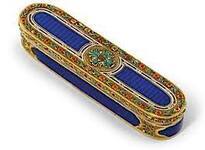 Meanwhile, in London, a faithful old servant comes to tell Sir Owen, you know that toothpick-case you were looking for? I found it here in your writing desk.
Meanwhile, in London, a faithful old servant comes to tell Sir Owen, you know that toothpick-case you were looking for? I found it here in your writing desk.“Good god!” exclaimed the baronet… “I now remember… Rash fool that I was!” He promptly blames his cousins, not himself: “why did Sir Tudor and his sister make me believe that my wife must have it, when they saw how angry it made me? Why did they interfere to do mischief?”
“Why, if I might be so bold as to speak without giving offence, I could tell your Honour something that would surprise you, Sir…” says “honest Gregory,” who forbears to add, and what would have been obvious to a five-year-old.
The baronet is dumbfounded when the truth is revealed and sends an abject letter of apology to Wales, but Julia, being on the brink of death, is too sick to read it. When she starts to recover, the dowager, who is now perfectly convinced that Julia is a wonderful girl, writes to Sir Owen: “Your amiable Julia… is now informed of your lively repentance…. and she begs me to assure you, that she has not a moment ceased to love and esteem [you]… the only request she has to make is, that all past troubles may be buried in oblivion, and every body forgiven. There, I must own, I dissent from her.”
Sir Owen gets trouble-making Sir Tudor a government posting out of the country and Jessica finds a husband—although, the narrator assures us, “they were not truly happy.”
So the moral of the story is, bear and forbear even if it almost kills you. Who would write or publish such an over-the-top story? The answer might surprise you. Next post.
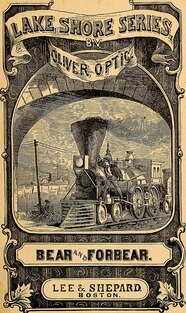 Yes, Jane Austen also made use of a toothpick case in Sense & Sensibility, in a comic sequence.
Yes, Jane Austen also made use of a toothpick case in Sense & Sensibility, in a comic sequence.The denouement of Bear and Forebear relies upon disclosures made by servants. Servants tend to play lesser roles in Austen, and people who chat with or about servants are vulgar characters in Austen, as discussed in this earlier series of posts.
Franco Moretti in his Atlas of the European Novel (1998) maps the locations of all the scenes in Austen's novels (apart from mentions of places like Ireland or Antigua) and shows that she never strayed very far: “a pattern does indeed emerge here of exclusion, first of all. No Ireland, no Scotland no Wales; no Cornwall. No ‘Celtic fringe,’… only England… And not even all of England: Lancashire, the North, the industrial revolution—all missing.”
Young men were also advised to bear and forbear, as in this 1870 Christian novel: Bear and Forebear, or, the Young Skipper of Lake Ucayga.
Published on June 12, 2022 00:00
June 8, 2022
CMP#105 The Bear and Forbear Heroine, pt 2
 Clutching My Pearls is my ongoing blog series about my take on Jane Austen’s beliefs and ideas, as based on her novels. When I say "my take," I very much doubt that I could find anything new or different to say about Austen, not after her admirers have written so much. But I am not trying to be new, rather I am pushing back at post-modern portrayals of Austen as a radical feminist. Click here for the first in the series.
Clutching My Pearls is my ongoing blog series about my take on Jane Austen’s beliefs and ideas, as based on her novels. When I say "my take," I very much doubt that I could find anything new or different to say about Austen, not after her admirers have written so much. But I am not trying to be new, rather I am pushing back at post-modern portrayals of Austen as a radical feminist. Click here for the first in the series.CMP#105 "Lady--Wife--Mother!" To Bear and Forbear
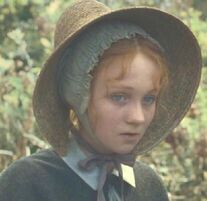 Helen Burns in Jane Eyre: "the Bible bids us return good for evil." In my previous post, I introduced a type of character I called the "bear and forbear" heroine. This is a girl or woman who endures hardship and suffering and is tolerant and forgiving--not out of weakness, but out of personal conviction. I mentioned the medieval character of Patient Griselda as an archetype of this character. We meet some Griseldesque (if that's a word) wives as well in the literature of the 18th and 19th century. Both male and female authors created Griselda-like characters.
Helen Burns in Jane Eyre: "the Bible bids us return good for evil." In my previous post, I introduced a type of character I called the "bear and forbear" heroine. This is a girl or woman who endures hardship and suffering and is tolerant and forgiving--not out of weakness, but out of personal conviction. I mentioned the medieval character of Patient Griselda as an archetype of this character. We meet some Griseldesque (if that's a word) wives as well in the literature of the 18th and 19th century. Both male and female authors created Griselda-like characters.In Jane Eyre, the rebellious main character is contrasted with the gentle and forbearing Helen Burns. Jane listens to what Helen tells her about turning the other cheek, she acknowledges Helen's goodness, but she cannot be another Helen in meekness. Helen is supposedly modelled on Maria Brontë, the oldest of the five Brontë sisters.
In The Denial, or the Happy Retreat (1792), by the Rev. James Thomson. Lady Wilton's husband was chosen for her by her parents. Lord Wilton has not treated her well; in fact he is a tyrant to her and their children. She carries out her wifely duties and carries herself so as to be above reproach. She advises her daughter to study to please her husband and "even if you do not meet with a reciprocation of tendernesses and good offices, remember, and let me caution you, that it is still your indispensable duty to act your part with cheerfulness and good nature; for the errors of the husband are no precedents to the wife; and retaliation will certainly render you contemptible here and miserable hereafter.” ... In Anna, or, the Memoirs of a Welch Heiress (1785), the mother of the hero bears with a profligate husband who spends the family fortune and neglects her in favour of his mistresses. He gives her venereal disease. The narrator explains, “Mrs. Herbert, as I informed my reader, had long lived on terms of the most miserable distrust of a husband she tenderly and passionately loved; --Still he offended, and still he was forgiven; till the consequence of his indelicate connections had injured her health –from that period she declined his bed; and his conduct since had been so little adapted to heal the shock her virtuous love for him had received, that she had gradually felt herself superior to the man who was continually wounding her pride and affection.”
Eventually, Mr. Herbert is arrested for debt and thrown into prison. Her grown children plan to return to Wales, but she insists on staying in London: “Mrs. Herbert declined accompanying them; she had hitherto fulfilled, to the utmost of her power, her conjugal duties, now could she now, in the hour of distress, notwithstanding his libertine conduct, prevail on herself to desert her husband. He had forbid her coming to him, but she chose to stay within reach of serving the father of her children.”
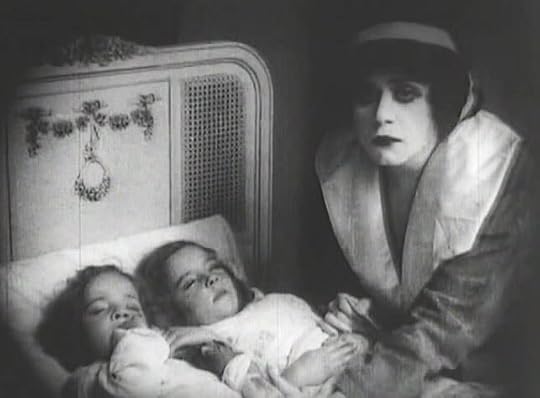 Theda Bara as the wife who didn't bear and forbear (1916 movie) The Victorian potboiler East Lynne (1861) was a tremendously popular novel and stage play which survived well into the 20th century. It involves a wife who leaves her husband then bitterly regrets it. The narrator exhorts the reader: "Oh, reader, believe me! Lady—wife—mother! should you ever be tempted to abandon your home… whatever trials may be the lot of your married life, though they may magnify themselves to your crushed spirit as beyond the nature, the endurance of woman to bear, resolve to bear them; fall down upon your knees, and pray to be enabled to bear them—pray for patience—pray for strength to resist the demon that would tempt you to escape bear unto death, rather than forfeit your fair name and your good conscience; for be assured that the alternative, if you do rush on to it, will be found worse than death.”
Theda Bara as the wife who didn't bear and forbear (1916 movie) The Victorian potboiler East Lynne (1861) was a tremendously popular novel and stage play which survived well into the 20th century. It involves a wife who leaves her husband then bitterly regrets it. The narrator exhorts the reader: "Oh, reader, believe me! Lady—wife—mother! should you ever be tempted to abandon your home… whatever trials may be the lot of your married life, though they may magnify themselves to your crushed spirit as beyond the nature, the endurance of woman to bear, resolve to bear them; fall down upon your knees, and pray to be enabled to bear them—pray for patience—pray for strength to resist the demon that would tempt you to escape bear unto death, rather than forfeit your fair name and your good conscience; for be assured that the alternative, if you do rush on to it, will be found worse than death.”
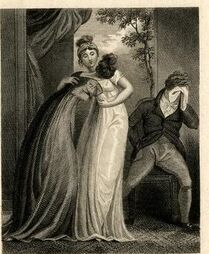 Lady Ann welcomes her husband's daughter by a first marriage Although Mr. Palmer of Sense & Sensibility is by no means so reprehensible a husband, we are reminded that the same scenario can be played for comedy as well as tragedy. Mr. Palmer is rude and dismissive of his wife, and her response is to "laugh heartily" when her mother reminds him that he is married for life. "The studied indifference and the discontent of her husband gave [Mrs. Palmer] no pain; and when he scolded or abused her, she was highly diverted."
Lady Ann welcomes her husband's daughter by a first marriage Although Mr. Palmer of Sense & Sensibility is by no means so reprehensible a husband, we are reminded that the same scenario can be played for comedy as well as tragedy. Mr. Palmer is rude and dismissive of his wife, and her response is to "laugh heartily" when her mother reminds him that he is married for life. "The studied indifference and the discontent of her husband gave [Mrs. Palmer] no pain; and when he scolded or abused her, she was highly diverted."When I read the play The Deserted Daughter (1795), I was honestly confused as to whether I was reading tragedy or comedy. The injured wife, Lady Ann, was so over-the-top, I thought her scenes were supposed to be played for laughs. Then I read the contemporary reviews and saw that, no, while her servant is a stock comic character, the wife is not a comic character.
Lady Ann swans around making speeches like: “What is the test of an affectionate wife? It is that, being wronged, her love remains undiminished, having cause of complaint, she scorns to complain, convinced that any misery is more welcome than the possibility of becoming the torment of her bosom’s Lord!”
Her servant Mrs. Sarsnet snarls: “He is a barbarian Turk! And so I as good as told him.”
Mrs. Sarsnet intercepts a letter to Lady Ann’s husband, but Lady Ann returns it to him without looking at it. “The heart, which I cannot secure by affection, I will not alienate by suspecting,” she tells him.
Mordent: Pshaw! Meekness is but mockery, forbearance insult.
Lady Ann: How shall I behave? Which way frame my words and looks, so as not to offend? Would I could discover?...
Mordent: Ay, ay! Patience on a monument…
Lady Ann also offers to turn over her marriage settlements to her husband to help him out of his financial difficulties. In the end, they are reconciled and Mr. Mordent admits: “Let me do her justice; She is a miracle of forbearance. I have hated and spurned at the kindness I did not deserve. Her perseverance in good has been my astonishment and my torture.”
Mrs. Pope, the actress who originated the role, was known for her Shakespearean and tragic parts, so I guess she played it straight. Adding to my confusion is that in the afterward (a comic soliloquy given at the end of a play), Mrs. Pope comes out and winks at the audience: yeah, we know that this is completely unrealistic... And now, thrice gentle friends, our plotting ended,
We hope you’re pleased –at least, not much offended.
Surely, you’ll own it was a little moving
To see a modern wife so very loving!
Who deems the marriage vow a thing expedient,
And is at once meek, faithful, and obedient.
Such whims were common in the Golden Age
But still they may be met with –on the Stage
But grant they now are false, past contradiction,
We hope they yet may be endured—in fiction
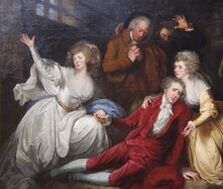 Mrs. Pope emoting in The Gamester So, even though not everyone seriously supposedly that all wives should "bear and forbear," the fact is that exaltedly virtuous heroines like Lady Ann were mainstream figures in plays and literature during the long 18th century. Another example--aimed at young readers--in the next post.
Mrs. Pope emoting in The Gamester So, even though not everyone seriously supposedly that all wives should "bear and forbear," the fact is that exaltedly virtuous heroines like Lady Ann were mainstream figures in plays and literature during the long 18th century. Another example--aimed at young readers--in the next post.
Published on June 08, 2022 00:00
June 6, 2022
CMP#104 The Bear and Forbear Heroine
 Since I've begun my look at Jane Austen, I've become very interested in studying the now-obscure novels of her time. I think they shed a light on Austen's work. Click here for the first in the series. Click on "Authoresses" on the right for more about other authors in Austen's time. CMP#104: Absolutely angelic--the "bear and forbear" heroine
Since I've begun my look at Jane Austen, I've become very interested in studying the now-obscure novels of her time. I think they shed a light on Austen's work. Click here for the first in the series. Click on "Authoresses" on the right for more about other authors in Austen's time. CMP#104: Absolutely angelic--the "bear and forbear" heroine 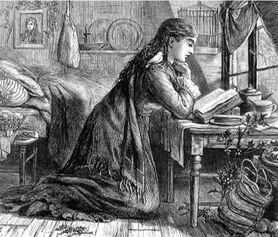 Suffering in a garret In
earlier posts, we've looked
at "pictures of perfection" heroines who have no faults. These heroines can be contrasted with imperfect, deluded heroines such as Emma Woodhouse or Catherine Morland who start out with mistaken notions which are corrected in the course of the novel. The "picture of perfection" heroine does not undergo a character arc because they start out perfect. They suffer and endure and they are rewarded in the end.
Suffering in a garret In
earlier posts, we've looked
at "pictures of perfection" heroines who have no faults. These heroines can be contrasted with imperfect, deluded heroines such as Emma Woodhouse or Catherine Morland who start out with mistaken notions which are corrected in the course of the novel. The "picture of perfection" heroine does not undergo a character arc because they start out perfect. They suffer and endure and they are rewarded in the end.Now I’m going to talk about another type of heroine--a more extreme version of the "picture of perfection" heroine--the “bear and forbear” heroine. This type of heroine suffers intensely through no fault of their own, and puts up with a great deal of mistreatment. She is explicitly held up to the reader, particularly the female reader, as someone to admire and emulate.
A prime example of this type of heroine is Fanny Belton, the heroine of The Woman of Letters (1783). I referred to this novel previously in my list of heroines named Fanny. Fanny Belton, the daughter of a poor curate, is orphaned early in the story. She behaves impeccably through her various travails, fleeing would-be seducers, and bearing with the unkindness of her aunt and cousins. Tossed out of the house by her aunt, she supports herself by her pen while nearly starving in a garret and fends off more would-be seducers. She doesn’t get to marry the man she loves because he was forced to marry someone else. When she comes home from church after marrying a man she doesn’t love, she gets a letter from the man she does love, announcing that he is now a widower and wishes to marry her. So she misses her happy ending by one day. Fanny stays loyal to her worthless husband who only married her for her meagre savings. He takes all her money and spends it on drink and loose women. She and her child end up dying in debtor’s prison...
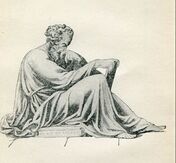 Epictetus (50 – c. 135 AD) The Woman of Letters is not an angry protest against the patriarchy. Apart from exhorting the reader to show more Christian charity toward fallen women and to help women in debtor’s prison, there is no call to action, no demand for criminal charges to be brought against titled and powerful sexual predators, no plea to change the common law that deemed that women’s property belongs to their husband, no call for reforms to the divorce laws, no calls, even, for reforms to the system of throwing people in prison for debt. Instead, the sufferings of Fanny Belton are intended to showcase her sublime rectitude. The virtue is the point, not the probabilities of the plot. Fanny's only consolation is the hope of happiness in the afterlife; there will be no justice for her here in this vale of tears. And the only fault the author ascribes to Fanny is that maybe, just maybe, she should have spent more time doing needlework and less time studying Greek and Latin as a child and thereby she’d be better able to support herself. However, Fanny’s study of the classical scholars such as Epictetus enables her to bear her sorrows with fortitude.
Epictetus (50 – c. 135 AD) The Woman of Letters is not an angry protest against the patriarchy. Apart from exhorting the reader to show more Christian charity toward fallen women and to help women in debtor’s prison, there is no call to action, no demand for criminal charges to be brought against titled and powerful sexual predators, no plea to change the common law that deemed that women’s property belongs to their husband, no call for reforms to the divorce laws, no calls, even, for reforms to the system of throwing people in prison for debt. Instead, the sufferings of Fanny Belton are intended to showcase her sublime rectitude. The virtue is the point, not the probabilities of the plot. Fanny's only consolation is the hope of happiness in the afterlife; there will be no justice for her here in this vale of tears. And the only fault the author ascribes to Fanny is that maybe, just maybe, she should have spent more time doing needlework and less time studying Greek and Latin as a child and thereby she’d be better able to support herself. However, Fanny’s study of the classical scholars such as Epictetus enables her to bear her sorrows with fortitude. The adage “bear and forbear" appears to originate with Epictetus. A book about classical proverbs explains: “Bear and forbear, a phrase frequently used by Epictetus, as embracing almost the whole that philosophy or human reason can teach us—Of this Epictetus as a memorable example, no man bearing the evils of life with more constancy or less coveting its enjoyments.” This explanation is by Robert Bland in his book, Proverbs, Chiefly Taken from the Adagia of Erasmus, with Explanations and Further Illustrated by Corresponding Examples from the Spanish, Italian, French and English Languages.
Patient Griselda
We cannot understand how any age could have been interested in Patient Griselda. -- Lionel Trilling
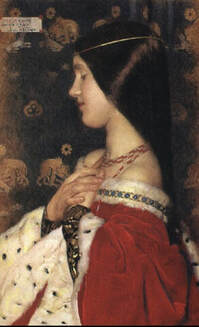 Patient Griselda, Frank Cadogan Cowper The ur- “bear and forbear” heroine is Patient Griselda, from The Decameron, a fourteenth-century collection of tales by the Italian writer Boccaccio. Chaucer retold the story of patient Griselda in his Canterbury Tales, and I think it was generally well-known as a folk tale. Griselda is an ordinary peasant woman who marries a nobleman. He treats her horribly--
here are the details,
if you want them--and she responds with submission and loyalty. Her virtue is rewarded in the end.
Patient Griselda, Frank Cadogan Cowper The ur- “bear and forbear” heroine is Patient Griselda, from The Decameron, a fourteenth-century collection of tales by the Italian writer Boccaccio. Chaucer retold the story of patient Griselda in his Canterbury Tales, and I think it was generally well-known as a folk tale. Griselda is an ordinary peasant woman who marries a nobleman. He treats her horribly--
here are the details,
if you want them--and she responds with submission and loyalty. Her virtue is rewarded in the end. I have no idea how readers of the day responded to the story of Patient Griselda, but to modern minds it is bizarre. How can being reunited with someone who has subjected you to horrible psychological abuse and deception be regarded as a “happy ending”?
Scholar Lois Bueler calls Patient Griselda an archetype of the "tested woman plot" and she finds many examples in literature.
Another example of a heroine who is tested and harbors no resentment is Hero in Much Ado About Nothing. Falsely accused of being unchaste --by her groom! --at the altar! She goes away (and presumably cries) until her good name is restored and she marries the man who defamed her.
Maria Edgeworth spoke approvingly of the heroine who bears her wrongs with quiet resignation in her novel Leonora, and we have a bit of a reminder of the difference between Elinor and Marianne in Sense & Sensibility: “The sacrifice of the strongest feelings of the human heart to a sense of duty is to be called mean, or absurd; but the shameless phrensy of passion, exposing itself to public gaze, is to be an object of admiration. These heroines talk of strength of mind; but they forget that strength of mind is to be shown in resisting their passions, not in yielding to them. Without being absolutely of an opinion, which I have heard maintained, that all virtue is sacrifice, I am convinced that the essential characteristic of virtue is to bear and forbear. These sentimentalists can do neither. They talk of sacrifices and generosity; but they are the veriest egotists—the most selfish creatures alive.”
Edgeworth also wrote a satirical novella, A Modern Griselda, about a neurotic, manipulative woman who destroys her marriage. A culturally literate person in Austen's time knew the tale of Patient Griselda. Heroines of Filial Piety
In Lady Jane’s Pocket, (1815) we meet the minor character of Miss Bromley, the only daughter of a widow who has grown deaf, senile, and peevish.
“Nothing can be more pitiable than her situation;” explains her friend Mrs. Sinclair, “doomed to be shut up with that poor superannuated woman all day, and in the evening obliged to make up a card party with a set that hardly know clubs from spades.”
But worse, Miss Bromley can’t leave her mother to emigrate to Canada to be with Major Knightley, the man she loves. “I do not know any one who has more merit. To bear and forbear has ever been her fate, and her filial piety has hardly any example.”
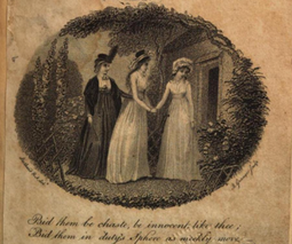 In Agatha, or a Narrative of Recent Events, (1796), we meet Jemima, a poor cottager, who takes care of her aged grandmother rather than leave the village to be with the man she loves. The heroine Agnes, touched by her sorrowful looks, comes to visit her and hear her story. Jemima’s “face was pale, and bore the strongest marks of sorrow; yet of a sorrow tempered with resignation, and which spoke the calm submission of a mild and gentle spirit, which had early learned to ‘bear and forebear.’” Her virtue is soon rewarded when she is reunited with her lover.
In Agatha, or a Narrative of Recent Events, (1796), we meet Jemima, a poor cottager, who takes care of her aged grandmother rather than leave the village to be with the man she loves. The heroine Agnes, touched by her sorrowful looks, comes to visit her and hear her story. Jemima’s “face was pale, and bore the strongest marks of sorrow; yet of a sorrow tempered with resignation, and which spoke the calm submission of a mild and gentle spirit, which had early learned to ‘bear and forebear.’” Her virtue is soon rewarded when she is reunited with her lover. However, not all other heroines who “bear and forbear” do not get a happy ending, including the heroine Agatha herself. Agatha agrees to take her vows and become a nun in France in the name of filial obedience, because her mother made a vow that Agatha would do so. In France, Agatha is caught up in the French Revolution, which persecuted priests and nuns. If she had instead ignored her mother’s injunction and married the man she loved, she and everyone she knows would have been happy, including her parents, who end up being guillotined by the revolutionaries. Instead, everyone ends up miserable or dead while Agatha, “blest with a spotless and self-approving heart… leads a life of peaceful resignation,” far from the troubled world, “in the firm hope and assurance of Eternal Happiness hereafter.”
You might be interested to know that here, at least, the reviewer for The Analytical Review felt he had to draw the line on this whole “sacrifice” thing, especially when they sacrifice involves Catholicism, for Pete’s sake: The conduct of Agatha, however glossed over with the specious names of heroism and filial piety, is in reality both weak and criminal: the sacrifices which she makes are not to reason and utility, but to prejudice and fanaticism…. to make rash vows is folly, to keep them vice; to promise for another person, or to suppose that other person under an obligation to perform such a promise, under which this story turns, though made by a parent, is still wilder and more absurd. Works of fiction, in order to render virtue lovely and imitable, should place it upon a just foundation… To draw characters, in which every thing human is hunted out of the composition, as in the heroine of the present work, is not to propose models for imitation. I think understanding this "bear and forbear" philosophy, (whether or not you agree with it) and the fact that it forms a thread in Western thinking, will shed light on the character of Fanny Price in Mansfield Park better. If you, like many others, don’t care for Fanny Price, I don’t expect to reconcile you to her, I only aim to help people understand her better. My intention is to place Fanny within her context in literature of this sort.
First, other examples of “bear and forbear” wives and heroines in literature, and some information which might surprise you about the publisher of one of these stories. At the end of A Marriage of Attachment, the second book in my Mansfield Trilogy, Fanny stops bearing and forbearing and has a confrontation of sorts with her Aunt Norris. Go here for more about my books.
Robert Bland’s guide to proverbial sayings of the classical authors was published in the same year as Mansfield Park and by the same publisher, Egerton. I’m not saying that there is a connection between these two books, it’s just that no Austenite who had noticed this fact could omit to mention it.
An entertaining modern review and analysis of Agatha, or, A Narrative Of Recent Events is to be found at the “Course of Steady Reading” blog. Bueler, Lois E.. The Tested Woman Plot: Women's Choices, Men's Judgments, and the Shaping of Stories. United Kingdom, Ohio State University Press, 2001.
Published on June 06, 2022 00:00
May 30, 2022
CMP#103 Fanny, the forgiving heroine
 Clutching My Pearls is about Jane Austen and the times she lived in. Those who speak of the past mainly to condemn but also want to rescue Jane Austen from the dustbin of history have a bit of a dilemma on their hands. Click here for the first in the series. CMP# 103 Book Review: Fanny, or, the deserted daughter
Clutching My Pearls is about Jane Austen and the times she lived in. Those who speak of the past mainly to condemn but also want to rescue Jane Austen from the dustbin of history have a bit of a dilemma on their hands. Click here for the first in the series. CMP# 103 Book Review: Fanny, or, the deserted daughter 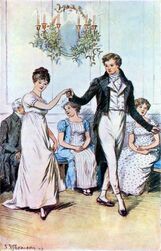 Admired by Lord de Grey I've been talking about the Austen interpretations of scholar Jillian Heydt-Stevenson and why I disagree with them. To recap, I looked at whether the name "Fanny" had the same connotations in Austen's time as it does today. I concluded that it was fine to name your daughter "Fanny" back then. There were a lot of nice Fannies around. As well, I expressed my doubt about the theory that Austen wanted readers of Mansfield Park to think of an essay by Dr. Johnson concerning a girl who had been groomed into prostitution by an older male relative. I noted that the supposed similarity between Mansfield Park and Johnson's essays were not remarkable or noteworthy at all. It isn't at all difficult to find many novels which share plot points with Mansfield Park, particularly novels with the theme of a poor dependent heroine.
Admired by Lord de Grey I've been talking about the Austen interpretations of scholar Jillian Heydt-Stevenson and why I disagree with them. To recap, I looked at whether the name "Fanny" had the same connotations in Austen's time as it does today. I concluded that it was fine to name your daughter "Fanny" back then. There were a lot of nice Fannies around. As well, I expressed my doubt about the theory that Austen wanted readers of Mansfield Park to think of an essay by Dr. Johnson concerning a girl who had been groomed into prostitution by an older male relative. I noted that the supposed similarity between Mansfield Park and Johnson's essays were not remarkable or noteworthy at all. It isn't at all difficult to find many novels which share plot points with Mansfield Park, particularly novels with the theme of a poor dependent heroine. Here, for example, is another novel featuring a sweet and faultless Fanny as its heroine. This story has some “remarkable similarities” to both Mansfield Park and Johnson’s essays about Misella the prostitute. But this novel does not have a radical anti-patriarchal theme, as we will see.
In Fanny, or, the deserted daughter (1792), Fanny Vincent, a girl of unknown birth (it's complicated) is raised in the home of a baronet, Sir Peter Sinclair, and is looked down upon by the baronet’s daughter...
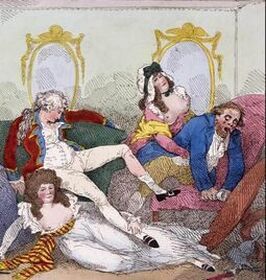 The Prince Regent setting a bad example Starts out like Mansfield Park
The Prince Regent setting a bad example Starts out like Mansfield ParkFanny’s guardian, Sir Peter Sinclair, a baronet, is so debauched that after his wife’s death, his home “was by turns the prey of gamblers, parasites, and harlots. Women, were, however, his prevailing passion, and his house was perpetually filled with a tribe of loose, disorderly, females, who excluded all better company, and fixed a stigma on Sinclair-house…”
This is rather similar to Mary Crawford’s situation in Mansfield Park; after her aunt dies and she has to leave her uncle’s house because he brought his mistress to live with him openly. I think there are other similarities too, but I'll leave them for Austenites to spot.
Augusta Sinclair, the baronet’s daughter, is actively cruel to Fanny. After her mother--who was Fanny’s protector—dies, Augusta maliciously downgrades her from companion to waiting woman. Augusta discontinues Fanny’s piano lessons as not suitable for her station in life. Fanny "determines to relinquish all accomplishments" except needlework. She has to eat with the upper servants and is constantly reminded of her dependent position.
Fanny grows into a beautiful young woman and Augusta’s father, Sir Peter, notices. He holds a ball for the neighbourhood and gives Fanny a gift of some diamonds for her hair and his own miniature portrait, set in diamonds, for her to wear to the dance. The gift makes Fanny feel awkward. She doesn’t want to wear the jewelry to the ball, but Sir Peter insists. Spoilers Follow
From there, the plot diverges from Mansfield Park and is more like Johnson's essay about Misella. After the dance, (where everybody notices Sir Peter's attentions to Fanny and rumours start to circulate about her), Sir Peter tells our vulnerable, dependent heroine that she has a choice: she can become his mistress and be well-rewarded, or he will take her by force. He carries her off to a remote farmhouse where he has taken other girls in the past. Mary, a young servant, helps her escape in time.
Fanny finds work as a governess in London but, as is typical with novels of this type, she encounters cruelty through no fault of her own. The problem is, she is a beautiful girl and there are two young men in the house: Edmund and Matthew, who are, to say the least, distracted by her presence in the household. Edmund in particular pursues her, but she wants nothing to do with him. He is boastful and speaks wildly, rather like John Thorpe in Northanger Abbey. The women of the household resent her and want her out.
Then Fanny is offered a home by a society lady, but she goes from the frying-pan into the fire. She is preyed upon by a new admirer, Lord Montraville. Fanny repels his attempts to seduce her, and he feels guilty, which is a new sensation for him.
So let's compare the fictional Fanny Vincent to Dr. Johnson's Misella of my previous post. Both are penniless dependents. Both are pressured by their guardians into becoming kept women. Misella succumbs, but Fanny, though utterly powerless, has moral agency. She flees and tries to support herself. The tension and drama centers around Fanny being able to maintain her chastity. And we can add that Misella's story has the stamp of reality, while Fanny's story is a Cinderella fantasy, because of what comes next. Never mind the why and wherefore,
love can level ranks and therefore.... Love Can Level Ranks?
Lord de Grey, the nobleman next door, loves Fanny and begs her to marry him. She hesitates because she knows his parents won't approve. She calls herself "the unknown offspring at best of penury, perhaps of vice and infamy." In other words, she doesn't know if she comes from a good family and in fact she was probably born out of wedlock.
Lord de Grey declares that he doesn't care: “Oh! Miss Vincent, you cannot imagine that motives of no real consequence will ever outweigh with me the real happiness of the heart; that feeling the most blessed of men in your society, in your love, the whole world could offer any thing to my mind which could teach me to know regret.”
Here is an outright declaration that love levels ranks. Love conquers all. The class system doesn't matter. Compare this egalitarian message to Harriet Smith in Emma, the natural daughter of nobody knows who. She is not good enough to marry Mr. Elton, let alone Mr. Knightley. Or compare this to Ann Elliot's reaction to possibly having Mrs. Clay for a stepmother. Or compare this to Fanny Price's humility. Though she loves Edmund, "To her he could be nothing under any circumstances; nothing dearer than a friend. Why did such an idea occur to her even enough to be reprobated and forbidden? It ought not to have touched on the confines of her imagination."
After a lot of weeping and angst, Lord de Grey persuades Fanny to marry him in secret. Yes, Lord de Grey marries Fanny not knowing who she is. Can the author really intend such an egalitarian message?
Not really. Because soon after the marriage, we have the Big Reveal, which re-asserts the social order. By virtue of an the amazing coincidence, Fanny meets the one woman who knows who her parents are. Lord Montraville is actually her dad! Of course Fanny is blue-blooded and the offspring of legal marriage.
So we have it both ways: the message of Fanny, a deserted daughter is that love conquers all but also that bloodlines and family matter. Lord de Grey couldn't possibly have fallen in love with, say, the daughter of the dustman. The English class system is vindicated, just as occurs in The HMS Pinafore (1878), a hundred years after the Fanny novel. Nothing much changed with foundling plots.
Fanny Price too, was a powerless dependent. Everyone knew who her parents were, everyone knew who she was, but nobody knew her true worth, not until the family was rocked by scandal and crisis.
"Love has never crossed such boundaries of class." The author of Fanny, a deserted daughter does not like dwelling on guilt and misery any more than Jane Austen. This author resolves the storyline with a lesson about forgiveness. There is no comeuppance for the repugnant Sir Peter. The heroine, out of Christian charity, "cordially forgave" him, "willingly losing all remembrance of intended injury in gratitude for former favours" (i.e. she forgives the fact that he abducted her and was going to take her by force, because he paid for her upbringing and education.) And he is repentant because he is ill and will soon meet his Maker.
Fanny (now Lady de Grey) also forgives Lord Montraville, not only for trying to seduce her when he didn't know she was his daughter, but because she got misplaced, so to speak, as a baby. We know that Fanny Price's father made a "coarse joke" about her, and that Sir Thomas also remarked appreciatively on Fanny's improved complexion and figure. But that's nothing compared to the incest teases of other sentimental and gothic novels of the period. It's weird stuff.
Augusta, who made Fanny's life miserable when she was a poor nobody, is not repentant but the author makes sure that her life is hollow and tawdry. Now married, Augusta had "neither sense nor principle," and "[h]er character was totally lost, while she appeared in all public places... covered with jewels, exceedingly rouged, and attended by the minions of the present moment."
This tale, though bizarre to modern sensibilities, contained nothing to offend the reviewers of the time. The anonymous critic writing in the Monthly Review approved of the “moral tendency of the tale.” The author herself loftily declared in her preface, that if she were “conscious of a single line inimical to the interests of virtue, she would burn the book, rather than present it to the public, though she were sure of being celebrated as the first novel-writer of the age.” Whatever we might think of the moral lessons of Fanny, or, a deserted daughter, I think it is intended to valorize the saintly, forgiving, heroine. No matter what the Fates throw her way, no matter how she is misused and abused, she is never resentful. However, the moral lesson is packaged in a Cinderella fantasy. Fanny is rewarded in the end with true love, high status, and wealth.
Coming up on the blog, more examples of the "bear and forbear" heroine... Fanny, a deserted daughter, was advertised as "the first literary attempt of a young lady." Some sources give the author as Margaret Holford of Cheshire, but, but this looks to be a confusion with Holford's publication Fanny and Selima. In 1801, Holford published a novel titled First Impressions, which was of course Jane Austen's chosen title for her unpublished story of Elizabeth Bennet and Mr. Darcy. Austen changed the name to Pride & Prejudice.
Whoever the author is, she is more explicit than Austen in describing scenes of vice and sexual peril. There are fallen women in Austen, but the crimes and the consequences are kept offstage. Other writers such as Elizabeth Helme, Anna Maria Bennett and Maria Smyth were more explicit about bawds, brothels, prostitutes, venereal disease, and powerful men preying on vulnerable females. There's a whole other discussion to be had about the way that this and other novels portray the nobility, but I'll get to that.
Published on May 30, 2022 00:00
May 24, 2022
CMP#102 The Misery of Misella
 Clutching My Pearls is about Jane Austen and the times she lived in. Those who speak of the past mainly to condemn--but also want to rescue Jane Austen from the dustbin of history--have a bit of a dilemma on their hands. Click here for the first in the series. CMP#102 Did Dr. Johnson's Misella influence Austen's Mansfield Park?
In the last post
, I outlined scholar Jillian Heydt-Stevenson’s arguments in favour of her contention that the message of Mansfield Park is that marriage is akin to prostitution. I’ll repeat those arguments here:
Clutching My Pearls is about Jane Austen and the times she lived in. Those who speak of the past mainly to condemn--but also want to rescue Jane Austen from the dustbin of history--have a bit of a dilemma on their hands. Click here for the first in the series. CMP#102 Did Dr. Johnson's Misella influence Austen's Mansfield Park?
In the last post
, I outlined scholar Jillian Heydt-Stevenson’s arguments in favour of her contention that the message of Mansfield Park is that marriage is akin to prostitution. I’ll repeat those arguments here:  Dr. Johnson (1709-1784) The name “Fanny” suggests lady parts and prostitution.Fanny Price shares her name with Fanny Hill, a prostitute in a famous book which is still read today.Dr. Johnson, one of Austen’s favourite authors, wrote two essays about a prostitute, and the prostitute’s life story has plot similarities to Mansfield Park. Austen intended for her readers to notice this connection.A lewd riddle referenced in Emma includes the name “Fanny," a name associated with prostitutes, see #1.In the previous post I looked at (1) and (2). In this post, I’ll look at (3) and later, (a very deep dive), I’ll examine (4). Did a pair of essays by Dr. Johnson provide Austen with the narrative building blocks and the theme for Mansfield Park, supposing the theme is that marriage is like prostitution?
Dr. Johnson (1709-1784) The name “Fanny” suggests lady parts and prostitution.Fanny Price shares her name with Fanny Hill, a prostitute in a famous book which is still read today.Dr. Johnson, one of Austen’s favourite authors, wrote two essays about a prostitute, and the prostitute’s life story has plot similarities to Mansfield Park. Austen intended for her readers to notice this connection.A lewd riddle referenced in Emma includes the name “Fanny," a name associated with prostitutes, see #1.In the previous post I looked at (1) and (2). In this post, I’ll look at (3) and later, (a very deep dive), I’ll examine (4). Did a pair of essays by Dr. Johnson provide Austen with the narrative building blocks and the theme for Mansfield Park, supposing the theme is that marriage is like prostitution?Dr. Samuel Johnson (1709-1784), known as “the Doctor,” was--as Austenites know--Austen’s favorite moral writer in prose. The compiler of a famous dictionary and author of many essays, memoirs, and other works, he is a towering figure in English letters. Here is Heydt-Stevenson’s passage about Dr. Johnson where she asserts a definite connection between Mansfield Park and two essays by Dr. Johnson. “Austen also associates courtship with prostitution through the significant intertextual relations between [Fanny Price’s] story and [two essays by Dr. Johnson] numbers 170 and 171 from [the periodical] The Rambler. “The History of Misella Debauched by her relation” and “Misella’s Description of the Life of a Prostitute,” a sentimental narrative of a poor young woman seduced by her cousin/guardian.”
and
“The remarkable parallels between these two narratives—parallels that critics have not previously noted—suggest that Austen was working both with and against Johnson’s (apparently) nonfictional account.” My response:Yes, both stories start off the same way.But they diverge: Misella is groomed into prostitution and a life of misery and infamy, while Fanny Price is pressured to marry someone she doesn't love and then marries the man she loves.Heydt-Stevenson assumes that somebody who reads a story about a girl being pressured to make a financially advantageous marriage would think of prostitution and would think specifically of Johnson's essays. However,I can point to many stories featuring dependent females, so the "remarkable" parallels between Johnson and Austen are not so remarkable. It was a standard literary trope of the day and the starting point for many novels.I can point to stories in which the vulnerable female is pressured to become a courtesan; in other words, these stories more closely resemble Johnson's story than does Mansfield Park. I can point to stories that more closely resemble Mansfield Park than does Johnson's essay.I can point to stories where "fallen women" aka "deviant sisters," are treated sympathetically, as in Johnson's essay.But "deviant sisters" are not treated sympathetically in Mansfield Park.By tracing the roots of Mansfield Park to Johnson’s essay, Heydt-Stevenson attempts to strengthen her contention that Fanny Price’s story “collapse[s] the boundary between marriage and prostitution." But her assertion that there's a connection between Mansfield Park and Johnson's essays is nothing more than that--an assertion.
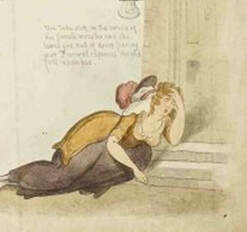 Progress of a Woman of Pleasure (detail) 1) However “remarkable” the resemblance between Johnson’s Misella and Austen’s Fanny Price might appear, a survey of 18th-century literature quickly reveals that stories about dependent female relations were not at all unusual and certainly not unique to Johnson and Austen. Further, dependent female relations, vulnerable to neglect, abuse, and sexual exploitation, were very common in real life. So, I disagree that the similarity between the Misella essays and Mansfield Park is “remarkable” at all.
Progress of a Woman of Pleasure (detail) 1) However “remarkable” the resemblance between Johnson’s Misella and Austen’s Fanny Price might appear, a survey of 18th-century literature quickly reveals that stories about dependent female relations were not at all unusual and certainly not unique to Johnson and Austen. Further, dependent female relations, vulnerable to neglect, abuse, and sexual exploitation, were very common in real life. So, I disagree that the similarity between the Misella essays and Mansfield Park is “remarkable” at all. The only similarity between the two essays and Mansfield Park occurs at the beginning of Johnson’s first essay in which Misella, (telling her story in the first person) explains: “I am of a good family, but my father was burthened with more children than he could decently support. A wealthy relation, as he travelled from London to his country seat, condescending to make him a visit, was touched with compassion… and resolved [to take] the care of a child upon him.”
2) After this opening, the plot, and as I will argue, the theme, diverges completely from Mansfield Park. Misella, financially dependent on her guardian, “saw with horror that he was contriving to perpetuate his gratification, and was desirous to fit me to his purpose, by complete and radical corruption.” She gives in, becomes pregnant, and it looks like she induces an miscarriage: (“He provided all that was necessary and in a few weeks congratulated me upon my escape from the danger which we had both expected with so much anxiety.”) Misella subsequently becomes the mistress of other men, and finally sinks to common prostitution. This is a story of sexual grooming that was undoubtedly all too true then and still true today.
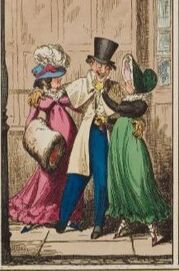 3) Heydt-Stevenson equates the pressures placed on Fanny Price to marry Henry Crawford with the sexual bondage endured by Misella. Here we bump up against the Heydt-Stevenson thesis that courtship is like sexual grooming and is tied to money. This supposes that both Austen and Dr. Johnson thought that marriage was like prostitution. Or it supposes that anyone who read Dr. Johnson would read his essays and think to themselves, "you know what? marriage is kind of like what happens to this Misella girl."
3) Heydt-Stevenson equates the pressures placed on Fanny Price to marry Henry Crawford with the sexual bondage endured by Misella. Here we bump up against the Heydt-Stevenson thesis that courtship is like sexual grooming and is tied to money. This supposes that both Austen and Dr. Johnson thought that marriage was like prostitution. Or it supposes that anyone who read Dr. Johnson would read his essays and think to themselves, "you know what? marriage is kind of like what happens to this Misella girl."This is a remarkably wild leap in the dark for Heydt-Stevenson to make in the face of all the contrary textual evidence. She can of course believe whatever she wants about marriage and prostitution. But to assert so confidently that Johnson--a man who held orthodox religious views--would see things the same way, is rather bewildering.
Johnson's message and purpose was NOT to equate marriage with being a sex worker. Misella's story is both a warning and a call for compassion. Misella writes: “I am one of those beings from whom many, that melt at the sight of all other misery, think it meritorious to withhold relief; one whom the rigour of virtuous indignation dooms to suffer without complaint, and perish without regard…" The prostitute is an outcast from society. Johnson's purpose was to urge compassion for women who have few economic choices in life and no legal independence, who are essentially forced into the sex trade.
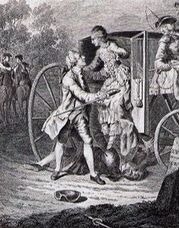 Sir Charles Grandison rescues Harriet Byron (4 to 7) Heydt-Stevenson is looking through the wrong end of the telescope when she traces a backwards line from Mansfield Park to Johnson's Misella essays. A broader survey of the literature of the day will show how frequently poor dependent females appeared as heroines.For more novels about poor dependent females living with relatives or other benefactors, consider Anna, or Memoirs of a Welch Heiress (1797),
The Bristol Heiress
(1809), Motherless Mary, (1816), The Woman of Letters (1783), and The Gipsey Countess (1799).There are many, many stories about innocent girls being pressured into becoming courtesans including the influential Samuel Richardson novels Pamela and Clarissa. Or try The Woman of Letters (1783), Anna, or Memoirs of a Welch Heiress (1797), Constance (1785), or The Officer's Daughter (1810). See also
"the fate worse than death."
For novels with similarities to Mansfield Park, try Celia in Search of a Husband (1809), Maria Edgeworth's Madame Panache (1806), Clarentine (1796), Geraldine (1820), and Fanny, a novel, in a series of letters (1786).For heroines who are benevolent to "fallen women," try Albert, or the Wilds of Strathnarven (1799), Celia in Search of a Husband (1809), The Officer's Daughter (1810), and Fanny Fitz York (1818).The History of Fanny Seymour (1769) is notable for its protest of the way girls were forced into marriage as a financial arrangement between families and it also treats a "fallen woman" very sympathetically. But it still doesn't "collapse the boundaries" between sex work and marriage insofar as the attitudes of the characters are concerned.In an age when marriages were about alliances between families, and not about romantic love, males as well as females were pressured or forced into marriages they didn't want. Men are coerced in The Woman of Letters (1783), Anna, or Memoirs of a Welch Heiress (1785), The Denial, or The Happy Retreat (1792), Consequences or Adventures at Rraxal Castle (1797), Thinks I to Myself (1812), Coraly (1819), and both the hero and heroine face this dilemma in the play The Runaway (1776).
Sir Charles Grandison rescues Harriet Byron (4 to 7) Heydt-Stevenson is looking through the wrong end of the telescope when she traces a backwards line from Mansfield Park to Johnson's Misella essays. A broader survey of the literature of the day will show how frequently poor dependent females appeared as heroines.For more novels about poor dependent females living with relatives or other benefactors, consider Anna, or Memoirs of a Welch Heiress (1797),
The Bristol Heiress
(1809), Motherless Mary, (1816), The Woman of Letters (1783), and The Gipsey Countess (1799).There are many, many stories about innocent girls being pressured into becoming courtesans including the influential Samuel Richardson novels Pamela and Clarissa. Or try The Woman of Letters (1783), Anna, or Memoirs of a Welch Heiress (1797), Constance (1785), or The Officer's Daughter (1810). See also
"the fate worse than death."
For novels with similarities to Mansfield Park, try Celia in Search of a Husband (1809), Maria Edgeworth's Madame Panache (1806), Clarentine (1796), Geraldine (1820), and Fanny, a novel, in a series of letters (1786).For heroines who are benevolent to "fallen women," try Albert, or the Wilds of Strathnarven (1799), Celia in Search of a Husband (1809), The Officer's Daughter (1810), and Fanny Fitz York (1818).The History of Fanny Seymour (1769) is notable for its protest of the way girls were forced into marriage as a financial arrangement between families and it also treats a "fallen woman" very sympathetically. But it still doesn't "collapse the boundaries" between sex work and marriage insofar as the attitudes of the characters are concerned.In an age when marriages were about alliances between families, and not about romantic love, males as well as females were pressured or forced into marriages they didn't want. Men are coerced in The Woman of Letters (1783), Anna, or Memoirs of a Welch Heiress (1785), The Denial, or The Happy Retreat (1792), Consequences or Adventures at Rraxal Castle (1797), Thinks I to Myself (1812), Coraly (1819), and both the hero and heroine face this dilemma in the play The Runaway (1776).
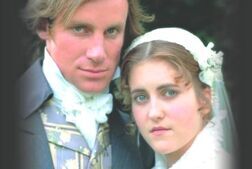 Happy ending or bitter ironic joke? Having it both ways
Happy ending or bitter ironic joke? Having it both ways8) Heydt-Stevenson argues that “Mansfield Park provides the opportunity to break down oppositions between respectable women and their deviant sisters, insofar as their bodies are negotiated as agents of exchange.”
But--quite obviously--Mansfield Park is the most judgmental of Austen’s novels when it comes to “deviant sisters.” Maria Bertram is punished for adultery, in contrast to Lydia Bennet, who is not punished for fornication in Pride & Prejudice. The compassion that Dr. Johnson urges his readers to show to fallen women is on display in Sense & Sensibility, in Colonel Brandon’s anguish over his lost love Eliza who was forced into marriage and the ran away with a lover. In Mansfield Park, Edmund and Sir Thomas are so disgusted by Maria and Henry’s “crime” that they don’t want her to marry Henry, and Maria can never darken the door of Mansfield Park again.
Heydt-Stevenson handles disjunction between her anti-patriarchal theories and the actual tone of Mansfield Park by explaining that Austen is intentionally having it both ways (emphasis added): “The remarkable parallels between these two narratives—parallels that critics have not previously noted—suggest that Austen was working both with and against Johnson’s (apparently) nonfictional account.” And: "Austen denounces the unequal ratio between male freedom and female constraint... [but she] also seems to acknowledge the irony [that she's written a marriage-plot novel] even though she is aware of the disturbing possibilities inherent in courtship..."
That "seems to" is doing a lot of heavy lifting.
Heydt-Stevenson's theory is therefore unassailable: everything that accords with her theory supports her theory, and everything that contradicts it, supports her theory as well. Because irony.
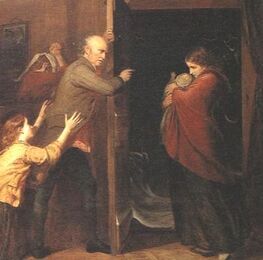 The Outcast (detail), Richard Redgrave Turning the story upside down to fit your thesis
The Outcast (detail), Richard Redgrave Turning the story upside down to fit your thesisFor Heydt-Stevenson's theory to hold together, we must conclude that Fanny and Edmund are not a happy couple who love and respect one another. Edmund doesn't mean it when he says Fanny is "too good" for him. Fanny is a willing accomplice in the bleak masquerade that is courtship and marriage. “Austen’s final joke is that one of the fallen women is in the parsonage.” And: “in such a society, all women are fallen." I know many people are not satisfied with the Edmund/Fanny pairing, but that's not the same as declaring the novel is a dark satiric attack on marriage and the patriarchy.
(9) As mentioned, Heydt-Stevenson's flimsy chain of reasoning relies on the assumption that she, Austen, and Dr. Johnson all have the same attitudes towards marriage and prostitution, that the former was just a prettied-up version of the latter. I don't think so. I don't think Austen, as a conventional churchwoman, held so low a view of matrimony. Here are some quotes from Dr. Johnson on marriage. I don't see any quotes where he says it's like prostitution. See also a discussion of 18th century attitudes about female chastity. I think Heydt-Stevenson's effort to connect Johnson's essays and Mansfield Park--in terms of either plot or theme--is unconvincing. Critics hadn’t previously noted a connection between the two because there was nothing worth noting. I don’t think Heydt-Stevenson has made a discovery here.
In future posts I'll tell you about: a novel that resembles Mansfield Park much more closely than the Misella essays, and a novel that takes up the topic of prostitution far more explicitly than Austen. For more critiques on modern Austen scholarship, see here. When I got to the end of A Contrary Wind, my novel based on Mansfield Park, I decided that Fanny Price was just not ready for marriage. She needed to grow up and find herself first. So the book became a trilogy. Click here for more about my books.
Scholar Elaine Bander gives an excellent overview of the Georgian novel and how Austen both parodied and adapted its tropes in her own work, in "Jane Austen and the Georgian Novel," in The Routledge Companion to Jane Austen. United Kingdom, Taylor & Francis, 2021.
Heydt-Stevenson, Jillian. Austen's Unbecoming Conjunctions : Subversive Laughter, Embodied History / Palgrave Macmillan, 2005
"I'm felicitous since during the course of the penultimate solar sojourn, I terminated my uninterrupted categorisation of the vocabulary of our post-Norman tongue."
Published on May 24, 2022 00:00
May 17, 2022
CMP#101 "Why do I not see my little Fanny?"
 Clutching My Pearls is about Jane Austen and the times she lived in. Those who think we should speak of the past only to condemn it, but still want to rescue Jane Austen from the dustbin of history, have a bit of a dilemma on their hands. Click here for the first in the series. CMP#101 Did Austen want us to think about lady parts?
Clutching My Pearls is about Jane Austen and the times she lived in. Those who think we should speak of the past only to condemn it, but still want to rescue Jane Austen from the dustbin of history, have a bit of a dilemma on their hands. Click here for the first in the series. CMP#101 Did Austen want us to think about lady parts? 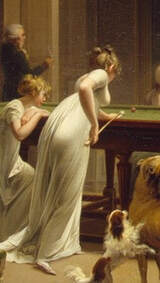 Game of Billiards (detail), 1807, Louis-Léopold Boilly “Where is my Fanny? Why do I not see my little Fanny?” asks Sir Thomas Bertram in Mansfield Park, and posterity snickers.
Game of Billiards (detail), 1807, Louis-Léopold Boilly “Where is my Fanny? Why do I not see my little Fanny?” asks Sir Thomas Bertram in Mansfield Park, and posterity snickers.Where I'm from, "fanny" means a derriere, as in "get your little fanny over here." But I've read that it's also a slang term for lady parts. I wanted to confirm this, then I got embarrassed when I thought about my Google search history, so I stopped. Then I found a useful book called The Lover's Tongue, which says "fanny" “emerged around 1928, and is now a familiar, albeit quaint, euphemism for the buttocks. The word fanny might have been inspired by John Cleland’s 1749 erotic novel, Memoirs of a Woman of Pleasure, the protagonist of which, Fanny Hill, is frequently exposing her bottom.”
Author Mark Morton adds: "Fanny has also been used to refer to the female genitals which might make a connection to Fanny Hill even more feasible.” So there you go.
Anyway, there are many slang names for lady parts, that’s for sure. And the derriere is undeniably an important part of female charms and is particularly in vogue today, it seems.
The question is, when we think of Fanny Price, are we supposed to think about lady parts? And when we think about lady parts, are supposed to think about prostitutes? And when we think of prostitutes, are we supposed to reflect that, after all, marriage is pretty much like prostitution? And are we intended to go on and realize that Mansfield Park "rigorously links prostitution to courtship and courtship to corruption in the culture at large"? Because, look at how Fanny's brother William got promoted to lieutenant...
In Austen's Unbecoming Conjunctions, Subversive Laughter, Embodied History, scholar Jillian Heydt-Stevenson argues Austen intended for her readers to follow this ramshackle train of thought...
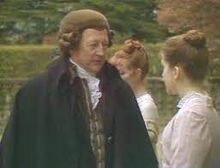 Sir Thomas and Fanny, 1983 mini-series I don’t want to quote Heydt-Stevenson out of context. She presents more than one argument in support of her thesis that we’re supposed to think of prostitutes when we think of Fanny Price. Heydt-Stevenson contends:The name “Fanny” suggests lady parts and prostitution and "Price" suggests prostitution.“Fanny” shares her name with Fanny Hill, a prostitute and protagonist of a famous book which is still read today. Two 1751 essays by Dr. Samuel Johnson, one of Austen’s favourite authors, bear similarities to Mansfield Park. These essays tell the story of a girl whose older relative and guardian is a sexual predator.A riddle referenced in Emma includes the name “Fanny,” which makes us think of prostitutes, which makes us, etc…Fanny's brother William is the beneficiary of Henry Crawford's intervention on his behalf, a promotion tied to power and sex. The corrupt system of patronage in the Royal Navy is but one aspect of "the way the patriarchal system objectifies both men and women" and "both Fanny and William become negotiable commodities..." In this post I’ll look at (1) and (2). Next, I’ll look at (3) and in the future (a very deep dive), I'll examine (4). As for (5), I think we have only to reflect on how intensely proud Austen was of her sailor brothers Francis and Charles, and how positively she portrays William Price in Mansfield Park and the navy in general in Persuasion but maybe I'll take that up in future. Anyway, on with the look at Fanny and her fanny... “[Fanny’s] very name signifies prostitution: the price of the body, a fact that seems to link her etymologically to the infamous Fanny Hill, the heroine of John Cleland’s Memoirs of a Woman of Pleasure (1749), familiarly referred to as Fanny Hill, the narrative that helped codify the name Fanny as slang for female genitalia… I am not suggesting that by including the name Fanny, a common enough appelation, Austen alludes to the Memoirs.” Declining popularity of the name "Fanny" Notice how Heydt-Stevenson suggests and then disclaims; the sly use of “seems” in “seems to link her etymogically,” followed by a disclaimer … “I am not suggesting that… Austen alludes to the Memoirs.”
Sir Thomas and Fanny, 1983 mini-series I don’t want to quote Heydt-Stevenson out of context. She presents more than one argument in support of her thesis that we’re supposed to think of prostitutes when we think of Fanny Price. Heydt-Stevenson contends:The name “Fanny” suggests lady parts and prostitution and "Price" suggests prostitution.“Fanny” shares her name with Fanny Hill, a prostitute and protagonist of a famous book which is still read today. Two 1751 essays by Dr. Samuel Johnson, one of Austen’s favourite authors, bear similarities to Mansfield Park. These essays tell the story of a girl whose older relative and guardian is a sexual predator.A riddle referenced in Emma includes the name “Fanny,” which makes us think of prostitutes, which makes us, etc…Fanny's brother William is the beneficiary of Henry Crawford's intervention on his behalf, a promotion tied to power and sex. The corrupt system of patronage in the Royal Navy is but one aspect of "the way the patriarchal system objectifies both men and women" and "both Fanny and William become negotiable commodities..." In this post I’ll look at (1) and (2). Next, I’ll look at (3) and in the future (a very deep dive), I'll examine (4). As for (5), I think we have only to reflect on how intensely proud Austen was of her sailor brothers Francis and Charles, and how positively she portrays William Price in Mansfield Park and the navy in general in Persuasion but maybe I'll take that up in future. Anyway, on with the look at Fanny and her fanny... “[Fanny’s] very name signifies prostitution: the price of the body, a fact that seems to link her etymologically to the infamous Fanny Hill, the heroine of John Cleland’s Memoirs of a Woman of Pleasure (1749), familiarly referred to as Fanny Hill, the narrative that helped codify the name Fanny as slang for female genitalia… I am not suggesting that by including the name Fanny, a common enough appelation, Austen alludes to the Memoirs.” Declining popularity of the name "Fanny" Notice how Heydt-Stevenson suggests and then disclaims; the sly use of “seems” in “seems to link her etymogically,” followed by a disclaimer … “I am not suggesting that… Austen alludes to the Memoirs.”On the other hand, Heydt-Stevenson confidently asserts that the last name Price “signifies prostitution," as though no other allusion to “price” could possibly occur to mind, as though the only thing people purchase with money is other people’s bodies. Why, for example, would genteel readers not think of the King James Version of Proverbs 31:10?
Who can find a virtuous woman? for her price is far above rubies. The heart of her husband doth safely trust in her.
Fanny’s virtue, in fact, is one reason Henry Crawford wants to marry her; she is “well principled and religious." “I could so wholly and absolutely confide in her [he tells his sister], and that is what I want.” “Confide” in this context means “trust.”
If Austen intended symbolism by the name "Price," maybe she means that Sir Thomas and Edmund discover her true value at the end of the book. Sir Thomas by then is "Sick of ambitious and mercenary connexions, prizing more and more the sterling good of principle and temper..." Look at the words Austen uses: "prize" "sterling"...
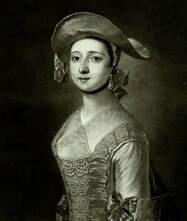 Fanny Murray (1729 – 1778) "A common enough appellation"
Fanny Murray (1729 – 1778) "A common enough appellation"“Frances” and its diminutive “Fanny,” were "common enough" in the past, but not so common today (see the chart above). There was the well-known real-life Frances Burney, aka Madame D’Arblay, the author. The poet John Keats fell in love with Fanny Brawne. Jane Austen had a sister-in-law named Fanny, of whom she was very fond.
Still, there's no denying that Fanny Murray was one of the most famous courtesans of the 18th century and maybe she inspired the creation of Fanny Hill, the protagonist of Memoirs of a Woman of Pleasure. Her own life was the subject of a 1759 memoir. But if “Fanny” inevitably brought lady parts and prostitution to the readers’ minds, as Heydt-Stevenson suggests, it is difficult to understand why so many authors chose the name for their singularly virtuous and virginal characters. Fanny Hill the prostitute is just one of dozens of fictional Fannies. There are Fannies in novels, plays, and poems. There are fatherless Fannies, faithful Fannies, friendless Fannies.
If you asked any well-read person today to name books in which the main character is named “Fanny,” The Memoirs of a Woman of Pleasure might well come to mind. It might be true today that the name "Fanny" is suggestive, but in Austen’s time, there were plenty of fictional Fannies who were as pure as the driven snow. Except for Fanny Price, Fanny Hill, and a few others--like Fanny Dashwood in Sense & Sensibility--these other fictional Fannies have largely been forgotten. The following examples will also illustrate attitudes toward chastity, marriage, and prostitution in the novels of the time, which is the larger topic I’m exploring here.
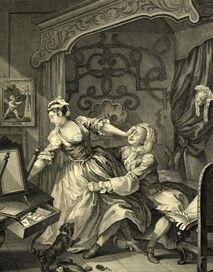 "Before," 1736, William Hogarth As Pure as the Driven Snow
"Before," 1736, William Hogarth As Pure as the Driven SnowLet’s start with Fanny Goodwill, the faithful sweetheart of Joseph Andrews in Henry Fielding’s The Adventures of Joseph Andrews (1742): In this satirical romp of a novel, Fanny is rescued from a ravisher, rejects a seducer, and comes to her marriage bed as a virgin.
In The Clandestine Marriage (1766), a play by Colman and Garrick, the cynical gold-digging sister's name is Betsey, the heroine's name is Fanny. She marries for love, not money.
The melodramatic tale of Fanny Adams and Lord Whatley was printed under different titles such as Injur’d Innocence, or, Virtue in Distress, aka The Love, Joy, and Distress, of the Beautiful & Virtuous Miss Fanny Adams; That Was Trapan’d in a False Marriage to Lord Whatley, aka Fanny, or The Happy Repentance. A young nobleman falls in love with a beautiful farmer’s daughter. Lord Whatley knows that Fanny would be horrified if he propositioned her. “These are the very people that have virtue, and Adams will not prostitute his own and his daughter’s honour for money; no, I will not wound the heart of a father; how could I presume to make such a proposal?” Lord Whatley's evil friend counsels him to trick Fanny with a false marriage ceremony, which he does, but soon he abandons her and marries an heiress. The writer dwells on the shattering anguish that Fanny and her father feel when they learn they have been deceived and her honour has been ruined. Lord Whatley eventually repents and marries Fanny once he is widowed.
In a similar tale, Lord Linrose in Hermione, or the Orphan Sisters (1791), falls in love with Fanny Williams, a farmer's daughter. Although she loves him, she virtuously repels his advances ("I abhor my Lord's insulting offers and proposals"). He impulsively marries her in a secret wedding. She dies of a broken heart after he grows tired of her.
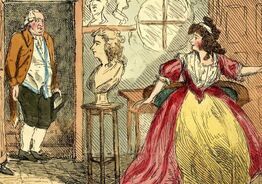 Caught peeping In The History of Fanny Meadows (1775), Fanny and her mother are left in poverty after the father’s death. The mother agrees to give her to a nobleman as his concubine. The virtuous Fanny resists the proposal strenuously. Lord Rutland, another nobleman, sees her weeping at the inn on her way to London with her mother, to be handed over to her fate. The Cambridge Orlando database explains: “She is saved when Rutland's aunt offers her employment, and is eventually able to marry the caring Rutland after it turns out that she is the daughter not of a farmer but of a lord.”
Caught peeping In The History of Fanny Meadows (1775), Fanny and her mother are left in poverty after the father’s death. The mother agrees to give her to a nobleman as his concubine. The virtuous Fanny resists the proposal strenuously. Lord Rutland, another nobleman, sees her weeping at the inn on her way to London with her mother, to be handed over to her fate. The Cambridge Orlando database explains: “She is saved when Rutland's aunt offers her employment, and is eventually able to marry the caring Rutland after it turns out that she is the daughter not of a farmer but of a lord.” Fanny Clifton, the heroine of Fanny, a novel, in a series of letters (1786), lives with her late mother's vulgar sister, but since she has a small inheritance, she is not completely helpless and dependent. The rakish Lord Davenant, a Henry Crawford type, falls for her charms. His ardour is further inflamed when they act together in some private theatricals. He bribes a servant to sneak him into Fanny's chamber. She discovers him hiding in her closet and calls the entire household to witness her innocence. But the shock of the affront to her virtue sends her into a fever with convulsions and she nearly dies. Lord Davenant is filled with remorse; thanks to the virtuous example of Fanny he reforms and they eventually marry.
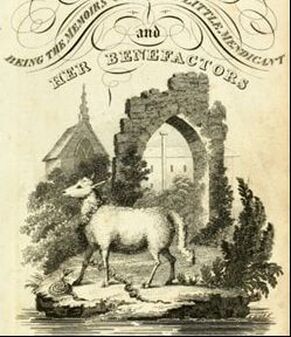 A title-page for Fatherless Fanny: innocent as a lamb Fanny Belton, the heroine of The Woman of Letters (1783), is the only daughter of a poor clergyman. He gives her a classical education and when he dies, she tries to earn a living by writing and translating. Several times, men who come forward claiming they want to help her just want to have sex with her, including an old college friend of her father’s: “He then declar’d, with the most bitter oaths and execrations, that he intended that night to be master of my person;--that he should from thence carry me to London, and settle a handsome fortune on me, and provide for my father;--with a deal more of the same odious stuff, which I cannot, and shall not repeat, as I cannot dwell on the horrid particulars. –Imagine my astonishment—my indignation. –The whole vile plot now appear’d. –I burst into tears,--which was lucky, as it preserv’d me from fainting.” A kind servant helps Fanny escape in time. The author commends her as an example of virtue and moral courage.
A title-page for Fatherless Fanny: innocent as a lamb Fanny Belton, the heroine of The Woman of Letters (1783), is the only daughter of a poor clergyman. He gives her a classical education and when he dies, she tries to earn a living by writing and translating. Several times, men who come forward claiming they want to help her just want to have sex with her, including an old college friend of her father’s: “He then declar’d, with the most bitter oaths and execrations, that he intended that night to be master of my person;--that he should from thence carry me to London, and settle a handsome fortune on me, and provide for my father;--with a deal more of the same odious stuff, which I cannot, and shall not repeat, as I cannot dwell on the horrid particulars. –Imagine my astonishment—my indignation. –The whole vile plot now appear’d. –I burst into tears,--which was lucky, as it preserv’d me from fainting.” A kind servant helps Fanny escape in time. The author commends her as an example of virtue and moral courage.Fatherless Fanny, or, the Little Mendicant (1811). This popular potboiler went through many editions and several revisions. Fanny is a foundling, left at a girl’s boarding school with an unsigned letter and some money. Fanny is helped by her friends at the boarding school and she is sponsored by a kind young nobleman, Lord Ellincort, Christian name Edmund. Her friend marries Lord Ellincort. Fanny grows from being an innocent child to a lovely, virtuous, woman. The husband of another one of her old school friends tries to seduce her but she indignantly repels him: “If the man who was so daring as to declare a passion for me last night, in defiance to decency and morality,” said Fanny, “if he can be found, I think he cannot be treated with more severity than he deserves; or more contempt that I feel for him.” Later, she is abducted and taken away to a remote Irish castle but a kind cottager helps Fanny escape in time. In the end she discovers her true identity and marries the man she loves.
In Fanny Fitz-York, the Heiress of Tremorne (1818), the heroine's spotless reputation is damaged by a scheming villain, a jealous rival, and some unfortunate misunderstandings, but Fanny is utterly chaste and blameless and she ends the novel with love, a title, and fabulous wealth. The villain sneers, “All priestcraft! Marriage is a political institution merely,” but he's the villain. There is a fallen woman in the story and her name is Julia. Her behaviour horrifies the other characters: “could such a female stoop to dishonour... and become the slave of licentiousness? The loss of her honoured parent [from the resulting shock] was only a secondary consideration; for death was a cessation of pain, an annihilation of feeling, and what feeling could be otherwise than pained at a daughter’s dishonour?”
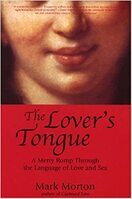 This is just a sampling of the virtuous Fannies in the stories available in Austen’s day. Yes, many of these girls faced titillating sexual peril, but they preserved their virtue.
This is just a sampling of the virtuous Fannies in the stories available in Austen’s day. Yes, many of these girls faced titillating sexual peril, but they preserved their virtue. I don’t think Heydt-Stevenson strengthens her thesis by suggesting that the name “Fanny” has sexual connotations. There is too much countervailing evidence that it was just another girl’s name at the time and there were no difficulties around naming a sweet, innocent, and virginal character as “Fanny.” According to Mark Morton, as we've seen, the Fanny/bottom connotation didn't arise until 1928, so Austen couldn't have known of it.
The connotations attached to a name can change over time, as anyone named “Karen” knows.
The fallacy of hypothesizing a connection between Fanny Price and Fanny Cleland without looking at the wider field of literature is one of several logical fallacies in scholarship which I discuss here.
Next post: Was Austen inspired to write Mansfield Park after reading Johnson’s real-life story of a girl who is groomed into prostitution?
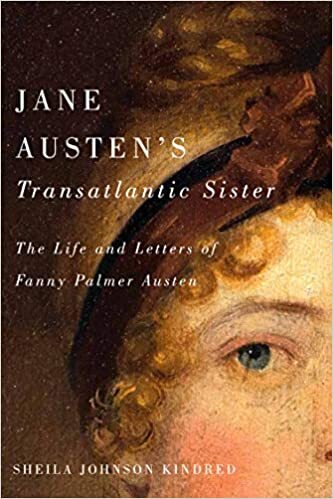 I never knew this! “Proverbs 31:10 Verses 10-31 are an acrostic poem, the verses of which begin with the successive letters of the Hebrew alphabet.”
I never knew this! “Proverbs 31:10 Verses 10-31 are an acrostic poem, the verses of which begin with the successive letters of the Hebrew alphabet.”I discuss Heydt-Stevenson's theory about Fanny Price's chain and cross in Mansfield Park in this earlier post. TLDR: all human relationships are mercenary and women are just objects to be bought and sold.
Jane Austen's Transatlantic Sister: the Life and Letters of Fanny Palmer Austen, by Sheila Johnson Kindred, tells the story of Jane Austen's sister-in-law. Imagine raising your children while living on a prison hulk!
Morton, Mark. The Lover's Tongue: A Merry Romp Through the Language of Love and Sex. United Kingdom, Insomniac Press, 2009.
Published on May 17, 2022 00:00
May 2, 2022
CMP#100 Six Critical Questions
 Many modern readers who love Jane Austen are eager to find ways to acquit her of being a woman of the long 18th century. Clutching My Pearls is my ongoing blog series about my take on Jane Austen’s beliefs and ideas, as based on her novels. Click here for the first in the series.
My One Hundredth Blog Post: Six Critical Questions, or Much Ado About Hedges
Many modern readers who love Jane Austen are eager to find ways to acquit her of being a woman of the long 18th century. Clutching My Pearls is my ongoing blog series about my take on Jane Austen’s beliefs and ideas, as based on her novels. Click here for the first in the series.
My One Hundredth Blog Post: Six Critical Questions, or Much Ado About Hedges
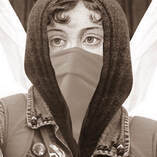 Was she radical? Since I started Clutching My Pearls, I’ve read a lot of Austen scholarship, some of which I've found useful and thought-provoking or informative, but a great deal of which I've thought is tedious, agenda-driven, unsupported, and even ridiculous.
Was she radical? Since I started Clutching My Pearls, I’ve read a lot of Austen scholarship, some of which I've found useful and thought-provoking or informative, but a great deal of which I've thought is tedious, agenda-driven, unsupported, and even ridiculous. I'm not an academic. My eyes glaze over at Derrida and Foucault--all that stuff is just beyond me. I have no quarrel with individual reactions to Austen, or with what people draw out of Austen. But I do have a quarrel with people who ascribe improbable opinions to Austen. These erroneous notions are promoted in the classroom and repeated on social media, and they deserve a rebuttal.
For my 100th blog post, I offer six simple questions which I think academics might profitably ask themselves when formulating their theories about who Jane Austen was, and what she believed... First test: When you formulate a theory based on something you’ve found in the text, have you checked to see if your theory is challenged elsewhere in the text?
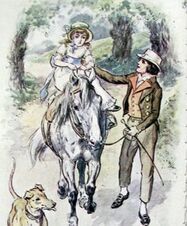 Timid and Weak Let’s say you’ve written a scholarly article about Mansfield Park, arguing that Austen uses Fanny Price to raise sympathy for, and awareness of, persons with disabilities. Let’s say you expand that idea to argue that Fanny Price’s “representation as a heroine disabled by chronic fatigue forces readers to confront the non-normative body and the ways in which disability intersects with issues of class, gender and sexuality.”
Timid and Weak Let’s say you’ve written a scholarly article about Mansfield Park, arguing that Austen uses Fanny Price to raise sympathy for, and awareness of, persons with disabilities. Let’s say you expand that idea to argue that Fanny Price’s “representation as a heroine disabled by chronic fatigue forces readers to confront the non-normative body and the ways in which disability intersects with issues of class, gender and sexuality.”Wouldn’t it be incumbent upon you to take into account the fact that Austen shows contempt for bodily weakness in Pride and Prejudice (Mrs. Bennet, Anne de Burgh) and ridicules it in Persuasion (Mary Elliot Musgrove), and--most notably--in Sanditon (the three Parker siblings). How can you discuss Austen’s attitudes toward invalidism without bringing Mr. Woodhouse and Mrs. Churchill of Emma into your discussion? Their invalidism doesn’t “marginalize” them, it gives them passive-aggressive power over everyone around them.
Surely these alternate portraits of invalids--three of them written after Mansfield Park--pose a challenge to your theory about Austen’s attitudes? Surely at least one of the peers who read this peer-reviewed article raised these objections?
Another example: let’s say that you view Maria Bertram as the tragic heroine of Mansfield Park, as Jillian Heydt-Stevenson does: “Maria’s crime, her refusal to abdicate strong sexual passions, and, in her elopement, her rejection of the culture’s conviction that one can achieve tolerable marital happiness by marrying for money, all become the mirror of what most seriously threatens society.” and “Maria’s expulsion, when she refuses to follow anyone’s idea of matrimony, functions to throw down the gauntlet in front of Sir Thomas.”
Taking this apologetic view of Maria involves some industrial-strength over-looking of the actual text and the authorial comments Austen makes about Maria. Austen plainly tells us that Maria deliberately chose to marry Mr. Rushworth, a man she holds in "contempt," and other characters openly discuss the fact that she's marrying for money and status. Her father offered to get her out of her engagement and she turned him down. Second test: If you are going to point out something that strikes you as interesting or significant in Austen, have you checked to see if the interesting/significant thing Austen did is in any way different from what her contemporaries were doing? Have you placed the thing you've noticed in its historical and literary context?
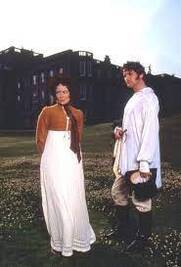 "The deepest blush" I’ve already pointed out that Austen wasn’t at all unique in focussing on issues of class and money in her novels, if anything, she is less pedantic than other novelists when listing the assets and expectations of their characters. I've also pointed out that she wasn't unique in being critical of the nobility, (and in fact was far less scathing than some other authors.)
"The deepest blush" I’ve already pointed out that Austen wasn’t at all unique in focussing on issues of class and money in her novels, if anything, she is less pedantic than other novelists when listing the assets and expectations of their characters. I've also pointed out that she wasn't unique in being critical of the nobility, (and in fact was far less scathing than some other authors.)Another example: Suppose you're writing your university thesis on the topic of blushing in Austen’s novels. Did your thesis advisors suggest that you explore whether Austen's use of blushing is similar to, or different from, every single other novelist of the period? Well, they should have. A deep blush suffuses the cheek of the heroine in every novel, and I mean every novel . Shouldn't you place your discussion of Austen's treatment of blushing within the context of the culture's relentless obsession with blushing?
Another example: If you point out that Austen tends to turn her authorial gaze away especially at a moment of high emotion, shouldn’t you also explain that this was a literary convention in her day?
Here is Daniel Stout pointing to the passage describing Fanny’s reunion with her brother William in Mansfield Park: “Their eager affection in meeting, their exquisite delight in being together, their hours of happy mirth and moments of serious conference may be imagined; as well as the sanguine views and spirits of the boy even to the last, and the misery of the girl when he left her.” Stout remarks: “Even where, as here, the narrative seems to set itself an opportunity to show us Fanny rather than tell, to represent rather than conjecture, it doesn’t follow through.”
So you might think, “Wow, isn’t that interesting. Austen really turns away from describing Fanny's emotions.”
However, this insight lands a little differently when we know that Austen’s “may be imagined,” is a variation on a common phrase of the period. I t was very common to describe people’s emotional reactions as something that could be “more easily imagined than described" or "better conceived than described."
Some examples: "Detached from her friends, and in the midst of an enemy's country, her situation may be much more easily imagined than described."(1785) "What his feelings were when he found that they had eluded his vigilance, may be more easily imagined than described." (1820)
To return to Jillian Heydt-Stevenson's suggestion, above, that Maria Bertram's "crime" was to challenge society's approval of mercenary marriage--whatever the reality of the times, obviously the literature and plays of the day disparaged mercenary marriages and fortune hunters; Maria Bertram is an exemplar of this type of character, someone who comes to a bad end because of her lack of principles. She's not a protest figure. Third test: Is your talent for finding hidden meanings--usually salacious-- in Austen’s text, simply a failure to understand the connotation or common usage of a word or phrase in Austen's time, or a failure to take context into account? Did you "consider times, persons, and probabilities"?
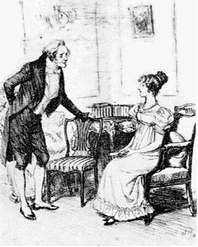 Old perv or old-fashioned gallantry? For many moderns, enjoyment of Jane Austen is enhanced by supposing that she is hinting at sexual meanings. For example, Heydt-Stevenson thinks it's "hilarious" to suppose that Mr. Woodhouse has syphilis.
Old perv or old-fashioned gallantry? For many moderns, enjoyment of Jane Austen is enhanced by supposing that she is hinting at sexual meanings. For example, Heydt-Stevenson thinks it's "hilarious" to suppose that Mr. Woodhouse has syphilis. John A. Dussinger argues that when Mr. Woodhouse pays his pro forma compliments to the newly-married Mrs. Elton, and she calls him her “old beau” and declares that her husband will be jealous, this means she thinks he desires her as a sexual partner.
"Ironically, though again no one in the scene appears to notice, it takes Mrs. Elton’s vulgar airs to pronounce the unthinkable about Mr. Woodhouse.”
Maybe no character in the scene “appears to notice” because this hidden sexual undertone is not there in the first place, and arises out of Dussinger’s placing a bizarre and unfounded connotation on this trite exchange. Speaking of, did you know that Mr. Woodhouse ejaculated in Emma's ear? Chapter 12.
Another example: Heydt-Stevenson thinks that when Mary Crawford speaks of girls who are “dying” for Henry Crawford in Mansfield Park, she's making a sly reference to orgasm.
Yes, “dying” was, still can be, be a euphemism for orgasm, just like “come.” I remember my college choir director pointing out how "I die" comes at the climax of the musical line when we sang John Dowland’s “Come Again.” But that doesn't mean an author always intends that connection; many people besides Austen used and still use the phrase "I'm dying to..."
I'll do some more "nudge nudge wink wink" in a future post.
Fourth test: Is your insight into Austen’s true meaning something that nobody else has ever thought of in 200 years? If so, have you considered the possibility that you are projecting a meaning on to the text which conforms to your ideological agenda? Have you applied Occam's Razor and remembered that novelists are in the business of telling stories?
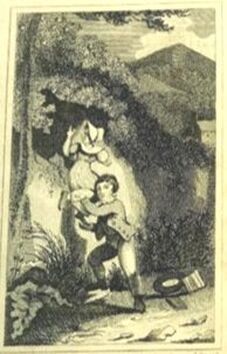 I've already looked at Helena Kelly's assertion that Jane Austen mentioned hedges and fences in Emma to protest enclosure, or the practice of enclosing common lands, which meant the poor had no place to feed their animals.
I've already looked at Helena Kelly's assertion that Jane Austen mentioned hedges and fences in Emma to protest enclosure, or the practice of enclosing common lands, which meant the poor had no place to feed their animals.Kelly repeated this assertion in a recent British television show, Britain’s Novel Landscapes , when the host, Mariella Frostrup, brought her onto the program to explain that when the word "hedge" or “hedgerow” appears in Emma,” it is “incredibly politically loaded.” This is something “we don’t see” today, because we've lost our understanding of its hidden meaning, but “in the 1810’s, this is basically a big political flashing sign.”
“Wow,” Frostrup responds. “So, did any other writers dare to use the word ‘hedge’ in their novels?”
No, she didn't say that. just kidding. Instead, Frostrup inaccurately explains that enclosure was “a new law.” It wasn’t. Enclosure happened well before Emma was written, although of course its effects, both positive and negative, were still being felt.
And of course many authors mentioned hedges. Isn't it incumbent on Kelly to explain why the use of “hedge” in other novels was or was not "a big political flashing sign"?
Here are two examples Kelly could go to work on, where hedges are not merely mentioned in passing--as in Emma--but are so central to the plot they are shown in the engraved frontispiece of the novel:
A children’s book, The Hedge of Thorns (1819), is a moral tale (naturally) about a boy who tries to push his little sister through a gap in a "quickset hedge" to get at an apple orchard. She gets scratched up and she tears her pinafore, and their exceedingly devout but poor parents pretty much threaten the boy with eternal hellfire.
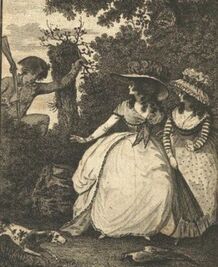 The hedge of thorns does have a symbolic message, but (a) it's not "enclosure" and (b) the author makes his symbolic analogies perfectly clear. You might think religion is the opiate of the people and the apple orchard should owned by a socialist collective, but that is not the intention of the writer: "Our heavenly father... puts, as it were, a hedge on this side and that side... some are hedged in by careful and vigilant parents..."
The hedge of thorns does have a symbolic message, but (a) it's not "enclosure" and (b) the author makes his symbolic analogies perfectly clear. You might think religion is the opiate of the people and the apple orchard should owned by a socialist collective, but that is not the intention of the writer: "Our heavenly father... puts, as it were, a hedge on this side and that side... some are hedged in by careful and vigilant parents..."In the Village of Martindale (1787), the author uses a hedgerow as a convenient device for the sudden intrusion of the novel’s villain upon the heroine and her friend.
Ophelia and Maria go for a long walk, then ‘lay down to rest themselves on some fallen trees that lay under a hedgerow, in a wheat stubble.”
The girls are admiring the pastoral view before them: “when a pointer suddenly sprang over the hedge; and before they could recover from their surprise; a gun went off so near them, that the shot rattled through the bushes, and passed just over their heads. A gentleman almost immediately burst through the enclosure, and ran to pick up a pheasant he had shot, which had fallen within a few yards of the place where they were sitting.”
This book actually uses that supposedly politically-loaded word “enclosure,” and Emma does not.
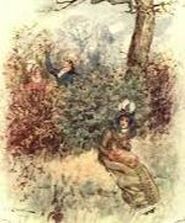 In other words, sometimes an author uses a hedgerow for narrative purposes, not to hint at the condition of the laboring classes. Let's compare Emma: "Miss Bickerton, excessively frightened, gave a great scream, and calling on Harriet to follow her, ran up a steep bank, [and] cleared a slight hedge at the top..." to Fanny Fitz-York, Heiress of Tremorne (1818): the vicarage is “separated from the church-yard by a gravel walk, bordered with a well cut hedge; very convenient, Miss Simpkin declared, for bleaching fine linen.”
In other words, sometimes an author uses a hedgerow for narrative purposes, not to hint at the condition of the laboring classes. Let's compare Emma: "Miss Bickerton, excessively frightened, gave a great scream, and calling on Harriet to follow her, ran up a steep bank, [and] cleared a slight hedge at the top..." to Fanny Fitz-York, Heiress of Tremorne (1818): the vicarage is “separated from the church-yard by a gravel walk, bordered with a well cut hedge; very convenient, Miss Simpkin declared, for bleaching fine linen.”I don't know about you, but I don't see a big political flashing sign. I see mentions of hedges.
The "slight hedge" in Emma serves a narrative purpose. Harriet Smith is out walking with a companion (because of course she wouldn't walk by herself.) Austen has to get rid of that companion to place Harriet in a faux-dramatic situation so Frank Churchill can "rescue" her. Harriet's friend is able to run up a bank and jump over a "slight hedge" to get away from the gipsies. Harriet can't because she has a muscle cramp. The situation for the rescue is set up.
In Persuasion, the hedgerow restricts what you can see, but you can still hear what's happening on the other side. Austen uses a hedgerow so Anne Elliot can overhear Captain Wentworth's conversation with Louisa Musgrove.
I find that modern critics often forget to think about the demands of story-telling, so intent are they on finding the hidden message. Occam's razor should apply. The error of supposing that Austen means something significant by the word "hedge" arises from the cumulative failure to apply all the critical tests I've listed above. Fifth test: Are the opinions you are ascribing to Austen so radical, and so contrary to what might be acceptable in a novel marketed to women, that she would have been unpublishable? OTOH, if your answer is, "nobody noticed it because Austen had to be sly and covert," have you checked to see if others wrote openly about the things you say Austen could only hint about? An example of too-radical: Heydt-Stevenson thinks Austen wrote marriage-plot novels arguing that marriage reduces women to chattel. Even if Austen's publisher John Murray agreed, he was in the business of selling novels. From a practical viewpoint alone, that's a self-sabotaging artistic choice. Novel-reading girls are not interested in this message. But as it happens--referring back to the fourth test--there's no evidence that John Murray--let alone anyone--noticed this message before Heydt-Stevenson did.
An example of the not-radical-at-all: Helena Kelly argues Austen had to be covert with her anti-slavery message in Mansfield Park: "It was a time of censorship and state surveillance." Marcus Wood has the opposite explanation, Austen chose to be extremely subtle in Mansfield Park because people were tired of lurid abolitionist literature which openly portrayed the cruelty of slavery: "the ideological waters surrounding slavery were muddled, not to say poisoned, by the propaganda wars of the preceding three decades. Had a writer of her subtlety even wished to enter the field... she would have had little that was topical to write about."
Likewise, on what basis did Kelly conclude that dropping the word "hedge" into her novel (and not the word "enclosure") was as far as Austen could go in protesting land enclosure? Sixth and Final Test: Is your interpretation unfalsifiable? Are your assertions indistinguishable from parody? If so, does this not raise some questions about the validity of your interrogative methods? Kelly says the "rough hedgerow" that Mrs. Grant has turned into a shrubbery in Mansfield Park also denotes enclosure and class oppression. On the other hand, Jillian Heydt-Stevenson says that when Fanny makes her speech about the shrubbery: ("it would be difficult to say whether most valuable as a convenience or an ornament,") she is “unconsciously analyz[ing] her own liminal situation: is she more valuable as a convenience or an ornament?"
Where Helena Kelly sees political meanings in material objects in Austen, Jillian Heydt-Stevenson sees the objectification of women-- just as we saw with their differing interpretations of the cross and chain in Mansfield Park. Can they both be right? These interpretations are pure speculation or unsupported assertions, arrived at partly or entirely because the scholar has ignored the five tests listed above. Some might find these interpretations compelling and convincing, but not because any kind of argument has been made for them. I'm not against speculation, but it should be clearly identified as speculation, not as an assertion of fact.
Here are three different interpretations of the significance of a sentence in Emma about Hartfield, the Woodhouse estate in Highbury. In each case, it's impossible to know if Austen intended this kind of interpretation or emphasis. Two are serious and one is a parody. Which is which?
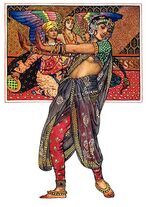 Austen: “The landed property of Hartfield certainly was inconsiderable, being but a sort of notch in the Donwell Abbey estate, to which all the rest of Highbury belonged.”Imperialist: It's easy to miss Austen's covert meaning here: 'notch" alludes to "notch-girls" and confirms that Hartfield was built with the spoils of East Indian plunder, not rents from land-holdings. The modern rendering of this word is 'nautch.'"Post-modernist: “Hartfield is a parergon: part of Donwell, though in the negative mode of the notch; neither inside nor outside. It is the not-Donwell in Donwell or the Donwell out of Donwell.”Sexual: “Austen sets in context, however, how little power Emma has... That detail questions whether in this match and in this society, Emma is
anything more than a ‘notch’
–slang for female genitalia...” You probably picked out the Heydt-Stevenson version, because she, as usual, reduces Austen's female characters to their female parts. The 'notch' means, literally, that Emma is a c___t. Personally, I think the word "notch" means "notch."
Austen: “The landed property of Hartfield certainly was inconsiderable, being but a sort of notch in the Donwell Abbey estate, to which all the rest of Highbury belonged.”Imperialist: It's easy to miss Austen's covert meaning here: 'notch" alludes to "notch-girls" and confirms that Hartfield was built with the spoils of East Indian plunder, not rents from land-holdings. The modern rendering of this word is 'nautch.'"Post-modernist: “Hartfield is a parergon: part of Donwell, though in the negative mode of the notch; neither inside nor outside. It is the not-Donwell in Donwell or the Donwell out of Donwell.”Sexual: “Austen sets in context, however, how little power Emma has... That detail questions whether in this match and in this society, Emma is
anything more than a ‘notch’
–slang for female genitalia...” You probably picked out the Heydt-Stevenson version, because she, as usual, reduces Austen's female characters to their female parts. The 'notch' means, literally, that Emma is a c___t. Personally, I think the word "notch" means "notch."Heydt-Stevenson also thinks the Miss Bates's chimney is significant: “Miss Bates hilariously interlaces the usual phallic signification of chimneys with the rivet in her mother's spectacles, which Frank Churchill wants to make 'quite firm.'"
Just kidding, that was me again. But actually, Heydt-Stevenson did think Miss Bate's speech about the kitchen chimney needing to be swept was laden with innuendo and demonstrates the objectification of women. Here is Heydt-Stevenson: “The women of Emma, all of whom—at least at one level of signification—are themselves chimneys. That is, their function is to remain fixed in place, designed to heat, to pleasure, and to heal others.”
Another example: Suppose I take a single word from Austen, and write a blog post about its liminal subversive covert significance, using an absurdly far-fetched allusion, and I don’t mean a single word of it, and I post it on April Fool’s day, and nobody says, “oh, is this a joke?”
Next Post: Fun with Fannies.... Abdelfattah, Nadya. "“The Deepest Blush”: Bodily States of Emotions in Jane Austen’s Novels." University of Cleveland. 2018.Dussinger, John A.. In the pride of the moment : encounters in Jane Austen's world. Columbus, Ohio State University Press, 1990.Heydt-Stevenson, Jillian. Austen's Unbecoming Conjunctions: Subversive Laughter, Embodied History. United Kingdom, Palgrave Macmillan US, 2016.Kelly, Helena. Jane Austen, the Secret Radical. United States, Knopf Doubleday Publishing Group, 2017. More animadversions on Ms. Kelly's work here. And here. Klein, Ula Lukszo. 2020. “Fanny Price as Disabled Heroine in Mansfield Park.” Studies in English Literature, 1500-1900 60 (3): 577–95. Normandin, Shawn. Jane Austen and Literary Theory. Routledge, Taylor & Francis Group, 2021.Stout, Daniel. Corporate Romanticism: Liberalism, Justice, and the Novel. Fordham University Press, 2016.Wood, Marcus. Slavery, Empathy, and Pornography. OUP Oxford, 2002.
Published on May 02, 2022 00:00
April 25, 2022
CMP#99 Celia, the Smiling Heroine
 CMP#99 Celia, the smiling heroine--with inverted quotes around “smiling”
CMP#99 Celia, the smiling heroine--with inverted quotes around “smiling”  That "plantation" didn't have a sinister meaning in Austen's time? What if I told you…
That "plantation" didn't have a sinister meaning in Austen's time? What if I told you…there's an 1809 novel that contains 14 uses of the word “slave” and one use of the word “plantation” and features a wise and benevolent character named Mrs. Mansfield ?
Well, if you aren't hip-deep in Mansfield Park commentary, I suppose you would say, “so?” But if you are au fait with modern scholarly analysis, you would know that Jane Austen’s Mansfield Park (1814) is generally thought to be named after Lord Mansfield , whose 1781 ruling in the Somerset case effectually ended slavery in the United Kingdom. And you’d be aware that although there is only one reference to the slave trade, in which no opinion is expressed, many scholars think Mansfield Park has a pro-abolition theme.
So what if I told you that Celia in Search of a Husband, despite using the word “slave” 14 times, and despite having a character named Mansfield, is absolutely not about slavery at all? The writer of this novel chose the name "Mansfield" because it's a fine old English name, and even though debates raged over slavery, it was common to speak of ladies making "slaves" out of their admirers, or being a "slave to fashion." (Austen has "Miss Crawford was not the slave of opportunity" in Mansfield Park.)
Celia in Search of a Husband has other fish to fry instead of British imperialism; it was written to take advantage of the popularity of Hannah More’s moralizing best-seller Coelebs in Search of a Wife which came out at the end of 1808. The success of More’s novel about a single man looking for a good wife led to many sequels (written by others, not More) and imitations. And yet, Celia in Search of a Husband is not really about a search for a husband, although a husband eventually shows up near the end. It’s about the heroine, Celia Delacour, travelling to the wicked city, observing its vices and follies, and explaining her Christian principles to anyone who will listen and lots of people who won't...
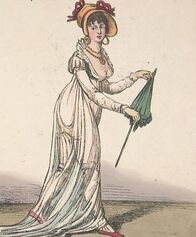 Our heroine "blushes" but she's always offended when anyone jokes that she’s come to London in search of a husband. She's on a visit of condolence because her older sister Lady Townly has lost a child, and she also hopes to nudge Fanny into giving up her empty London life.
Our heroine "blushes" but she's always offended when anyone jokes that she’s come to London in search of a husband. She's on a visit of condolence because her older sister Lady Townly has lost a child, and she also hopes to nudge Fanny into giving up her empty London life. One thing I’m noticing about these sentimental heroines of the past is that it makes a huge difference if they are heiresses. Heroines with money are more likely to have agency and to stand up for themselves. Nobody can bully Celia in the way Fanny Price is bullied by Mrs. Norris in Mansfield Park. Fanny begs her cousins to “please excuse” her from participating in their theatricals. When Celia is invited to play Juliet to a young swain’s Romeo, she responds, “No inducement could tempt me to an exhibition of the sort.” Fanny watches but says nothing to Lady Bertram when Henry Crawford behaves seductively toward both Maria and Julia. Celia openly declares: “It is certainly beneath the character of a delicate woman to admit a known seducer into her parties.” Fanny Price is judging you, but she keeps her thoughts to herself. Celia lets you know what she thinks.
But, when Celia explains that she needs an escort so she can leave the party by midnight, or that Lord so-and-so is a trifler, her little speeches are always punctuated by a smile. Several dozen times we read “said Celia, smiling” or “said our heroine, smiling.”
“What do you wear at [Lady] Cardonnel’s tomorrow?” her sister Fanny asks her.
“I shall find a dress that shall do,” said Celia, smiling.
“But… remember, my love, that the costume of an evening party is very distinct from a morning dress—in fact, you must undress to go into public.”
“I am not practically informed on this essential point,” said Celia, smiling, "but I have made some observations on a few whom I have seen—Lady Cardonnel, and Lady Blindon… but worlds should not tempt me to adopt the style of either…”
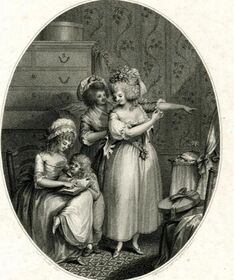 Celia befriends her sister's child while she is busy with her toilette Coelebs and Celia compared -- spoilers follow
Celia befriends her sister's child while she is busy with her toilette Coelebs and Celia compared -- spoilers followCelia is set in London and as usual, fashionable life in town is portrayed as being (a) horrible and (b) irresistibly tempting. Celia’s older sister Fanny, for example, has been corrupted by high life. She neglects her children and is eager to put off mourning and resume the social whirl after her little boy dies. Celia is never tempted by the vortex of dissipation, no, not for an instant.
As for style, Celia in Search of a Husband is very heavy on italicized emphasis. All of the characters speak in this emphatic fashion, and so does the narrator when she is directly addressing the reader, which is often. This gets pretty tiresome.
And yet, Celia the knock-off is somewhat more entertaining than the original Coelebs in terms of plot, because there actually is a central plot. Things actually happen in Celia. A sweet innocent girl is seduced, and Celia is briefly misled about who seduced her. The author contrasts Celia's staunch resistance of London wickedness with a sub-plot about her servant Patty, who falls for the wiles of a bigamist who steals all her savings.
In Coelebs, there is no impediment whatsoever keeping the hero and heroine apart. He stays at her father’s house, gets to know her, falls in love, proposes, and is accepted. In Celia, at least the author keeps us guessing as to who the heroine will marry, and she makes an effort to put impediments in the way.
Both Coelebs and Celia have a number of sub-plots involving minor characters--or rather, we have moralizing characters and thoughtless characters exchanging their opinions on the topics of the day, and we have gossip about the doings of various people. Both novels have a central figure whose chief function is to comment on the moral shortcomings of everyone around him and the faults of society in general. In Coelebs, that’s Dr. Stanley, Lucilla’s father. In Celia, it’s a friend of the Townly family, an older bachelor named Belford. The past is a foreign country
In a modern age, the moralizing Mr. Belford would have a job. He would therefore have better things to do than call on his neighbours and friends every day and tut-tut over their faults, a habit that you think would make him distinctly unwelcome, like King Gama in Princess Ida. But Mr. Belford is a gentleman and doesn’t have a job, and like all the other characters we meet (except for servants, of course), his days consist of paying visits and his evenings consists of dinners and other social engagements. He shows up everywhere Celia goes, anxious for her survival in the wicked city, and soon falls in love with her.
In addition to the things we've already mentioned, both Celia and Mr. Belford disapprove of:people who don't donate generously to charity.dresses without pockets--yes! (I think "pockets" meant a drawstring pouch hidden or attached to your clothes.)
Celia carries money so she can give alms to the poor. foolish fashions like opera hats (that is, top hats), monocles, artificial whiskers, "enamel eyes" (I think this is a reference to “lover’s eye” jewelry ), and male hairstyles: “And what an odd, yet frequent habit, I observe amongst the men, that of placing their hair, and, literally, combing the head with the fingers—is it to give them height when they do this? or is it fashionable to look as if they were frightened?”young gentlemen dressing like grooms and coachmen and taking up competitive horse driving (Celia dismisses one as "a mere jockey.")young gentlemen studying “scientific” boxing.erroneous educational fads for children.ornamental lanterns and other gewgaws.showy Italian-style piano playing.epicureanism, that is, elaborate dinners with lots of dishes and fancy French sauces.
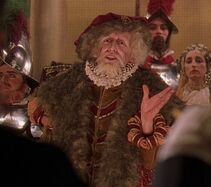 "Each little fault of temper and each social defect
"Each little fault of temper and each social defectIn my erring fellow-creatures, I endeavour to correct.
To all their little weaknesses I open people's eyes;
And little plans to snub the self-sufficient I devise;
I love my fellow creatures — I do all the good I can --
Yet ev'rybody says I'm such a disagreeable man!
And I can't think why!" -- Gilbert & Sullivan
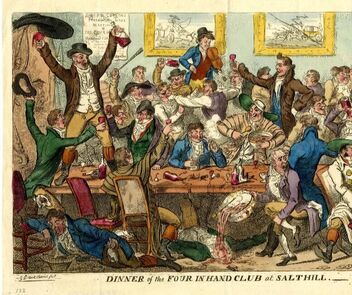 The Four in Hand club, a club for gentleman driving enthusiasts The country is going to the dogs
The Four in Hand club, a club for gentleman driving enthusiasts The country is going to the dogsCelia tells her sister frankly that she's repelled by the social set in London: "they are slaves, apes, discontented, envious beings, applauding with one breath, and censuring in the next; and the hypocrisy, Fanny—I blush to reflect on all I have heard.”
An elderly colonel drops by in one scene to pronounce: “When I meet the sons of men, whose names yet live in the memory of their country, when I see young and active men wasting their lives in pursuits, not only useless but degrading, I blush for my country—I anticipate an awful termination of that glorious constitution…”
A contemporary reviewer thought the novel did not exaggerate; the idle rich were setting a bad example for the lower orders. One reviewer said: “We are extremely sorry to say, that, as far as our knowledge of fashionable life goes, the picture is generally like. We say it with the more sorrow, because we know it to be very possible, that the vices and follies of one important class may bring down the very worst evils upon the whole community.”
The reviewers chose to overlook Celia's shortcomings as a novel, such as its lack of "discrimination of character," (ie everybody talks the same way), because of it’s “infinitely higher and more estimable qualities, those of Christian humility and Christian charity.”
(To an amazing extent, the reviewers of novels in Austen's age commented on the "moral tendency" of the novels they read, and very often the author added a preface explaining that their novel condemned vice and uplifted virtue.) Precursor to Mansfield Park?
Does Celia in Search of a Husband resemble Mansfield Park? Let's count the ways: the heroine is a prig, she lives with her aunt, one of the characters is named Fanny, another is named Mansfield, some frivolous people are fond of amateur theatricals, Celia is pressured to marry an eligible suitor she doesn't love, and it features a woman who leaves her husband and runs off with her lover. As well, there is one conversation which resembles Edmund Bertram and Mary Crawford's reactions to Maria's adultery:
(Fashionable Fanny wants to forgive Lady Ellincourt for her adultery.) “Sir Frederic will marry her directly,” said Lady Townly—"and she will be received in society, and we shall all forget what is past."
“Not all,” said the Baronet [Fanny's husband] with warmth, “nor shall she ever be admitted here, under any name.”
Celia blushed for her sister. There was a want of delicacy in her present defence…. If her understanding was not warped, her religion must be imperfect…”
In Mansfield Park, Austen acknowledges that social sanctions are worse for adulterous women than for their partners. Mr. Belford condemns both Lady Ellincourt and Sir Frederic: “the accomplished seducer who leads the married woman from the path of honour, is absolutely caressed, supported in his infamy, and his guilty partner received where she ought to be spurned…”
Although I think there is no hidden slavery message in this novel, there was one passing reference to “an Asiatic” fortune which “was made most rapidly." It seems to me that the nouveaux riche were sneered at just for being nouveaux riche rather than their exploitation of people of color living in distance climes. Celia's author is unknown
Celia in Search of a Husband is not part of my new series of book reviews of novels that never got a review when they were published. It was well reviewed, chiefly for its morality, as apart from its literary merit, and went into three editions.
Celia was authored by the anonymous "A Modern Antique," which I think is meant to convey that the author held staunchly to traditional views. The book is also credited to Medora Gordon Byron, which is almost certainly not his or her real name either. It's odd that a book promoting evangelical Christianity would be written by someone who later appropriated the family names of the scandalous poet Lord Byron. "Lord Byron, get out of town."
Language warning. The Orlando Database of Women's Writing in the British Isles says of the author of Celia: "Miss Byron, or Medora Gordon Byron, or Julia Maria Byron, whose identity is still a mystery, published either five or eight early-nineteenth-century novels with the Minerva Press, depending on whether or not they include those issued as by A Modern Antique. Both strings of fiction are exclamatory in style, interested in domesticity, and latterly in the unmarried (both men and women), given sometimes to commentary on novel-writing."
The characters of another Minerva Press novel, Stratagems Defeated, speak admiringly of Celia Delacour and Celia in Search of a Husband. Celia herself, I suppose, would never read a novel.
I've got some more "judge-y" heroines coming up in future posts, but...
Next : My 100th Clutching My Pearls post! I mentioned that Coelebs in Search of a Wife inspired many knock-offs and sequels. In fact, scholars have argued that Mansfield Park and its heroine Fanny Price are heavily influenced by Hannah More's writings, with her emphasis on education that stressed morality and character, not showy accomplishments.
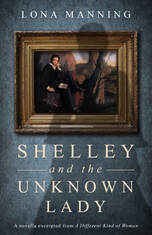 Lord Byron went to the continent, followed by Percy Bysshe Shelley. Shelley later told Byron that a beautiful, wealthy woman left her husband and followed him all over Italy. She caught up with him in Naples and died there. Was Shelley's story true? I used this mysterious story as the basis of my novella, Shelley and the Unknown Lady.
Lord Byron went to the continent, followed by Percy Bysshe Shelley. Shelley later told Byron that a beautiful, wealthy woman left her husband and followed him all over Italy. She caught up with him in Naples and died there. Was Shelley's story true? I used this mysterious story as the basis of my novella, Shelley and the Unknown Lady.For more about Shelley, click on the menu on the upper right. For more about my story, click here.
Published on April 25, 2022 00:00
April 19, 2022
CMP#98 Did Austen Care About the Poor?
 "Here begins the village. Those cottages are really a disgrace. The church spire is reckoned remarkably handsome... Those are almshouses, built by some of the family."
"Here begins the village. Those cottages are really a disgrace. The church spire is reckoned remarkably handsome... Those are almshouses, built by some of the family."-- Maria Bertram pointing out the features of the village
next to Sotherton in Mansfield ParkCMP#98 Did Austen Care About the Poor? In the previous post, we looked at the grim reality of poverty in Regency England. The sufferings of the poor were reflected in the novels of the day. The heroines of sentimental novels were often portrayed as charitably ministering to the poor, a sure way of establishing their bona fides.
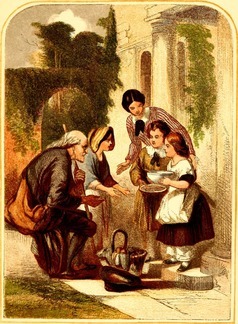 The
deserving poor
are portrayed with a great deal of sentimentality in novels of this era. The gratitude of the peasantry toward their benefactors involves a lot of blessing and lisping:
The
deserving poor
are portrayed with a great deal of sentimentality in novels of this era. The gratitude of the peasantry toward their benefactors involves a lot of blessing and lisping:In Secrets Made Public (1808), Ellen, the foundling/ward of benevolent Sir Octavius, is “the constant companion of his charitable excursions, and her sensibility was spoken by the tear that glittered in her eye, as the infant to whom she gave bread lisped its little prayer of thanks, or the white-headed old man crossed his hands on his breast, and, looking to the heavens, breathed a silent blessing on his benefactor.”
In Geraldine, or Modes of Faith & Practice (1820), the heroine recollects the happy days when she used to visit the cottagers with her late mother: “The labourers, returning with slow and wearied step from their daily toil, had quickened their pace, at her approach, and bowed in silent gratitude to their benefactress. The little children had ceased their sports on the green, and ran to claim a smile from the kind lady. The ‘busy housewife’ had left her wheel, to drop a courtesy, and call down blessings upon her.”
The hero of The Denial (1792) helps a destitute gentlewoman and her children. “After a silence of some seconds, she said, “This charitable donation will confer happiness and plenty, blessings to which I have long been a stranger. Accept the thanks of a grateful heart, and as soon as my little-ones can lisp your name, I will teach them to bless that hand which hath so liberally contributed to the relief of their misery.”
The History of Lady Julia Mandeville, (1792), relates how “Lord Belmont enjoys the most unmixed and lively of all human pleasures, that of making others happy… every eye shines with transport at his sight; parents point him out to their children; the first accents of prattling infancy are taught to lisp his honoured name; and age, supported by his bounteous hand, pours out the fervent prayer to Heaven for its benefactor.”
I think I'm seeing a pattern here...
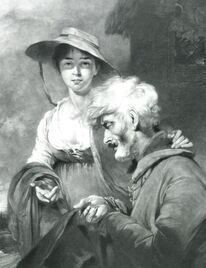 The Blind Beggar of Bednall Green, detail, Owen/Ward, British Museum Heroines Acting on Their Own
The Blind Beggar of Bednall Green, detail, Owen/Ward, British Museum Heroines Acting on Their OwnBeing charitable was one of the few ways a gentlewoman could show agency, when you think about it. They were not supposed to travel on their own or work at a job. Mrs. Stanley, the mother of the heroine in Coelebs in Search of a Wife, tells Charles (“Coelebs”) “I have often heard it regretted that ladies have no stated employment, no profession. It is a mistake. Charity is the calling of a lady; the care of the poor is her profession.”
In Celia in Search of a Husband, (1809) the heroine resolves to go to the aid of a girl who has been seduced and abandoned and is dying alone, despite the strong social sanctions against an unmarried girl like Celia having anything to do with a "fallen woman." She resolves to herself, mentally addressing the wronged Jessy: "“I will steal an hour, and visit your deserted abode, though a thousand fingers should be pointed at me—I feel I cannot be wrong in doing so, and I believe I have the power to give you some comfort.” – With these feelings the benevolent Celia retired, Charity soothing her slumbers…”
Fanny and Elizabeth, the dual heroines of Elizabeth Helme's Modern Times (1814) use some of their riches to set up a school and a medical clinic in the village near their stately home.
The heroines of The Bristol Heiress (1809) and A Winter in Town (1809) come to the aid of people injured in carriage accidents. Seraphina in A Winter in Town meets resistance from her servants, who warn her that the woman lying in the street with a broken leg is probably a street walker who ought not to be taken into her carriage. Both heroines insist on doing the right thing.
The heroines often receive an unlooked-for reward for their benevolence. Both Seraphina and Coraly are rescued from evil abductors by people who feel indebted to the heroines for some previous act of kindness. Thus the charitable action not only establishes the heroine's innate goodness, it comes in handy for plot purposes.
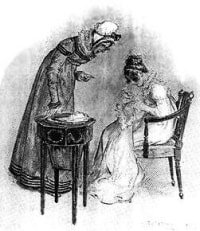 Mrs. Norris berates Fanny
Noblesse Oblige
Mrs. Norris berates Fanny
Noblesse Oblige
For authors of the long 18th century, charity to the poor is one of the duties of the landed gentry. Austen mentions this duty, but mentions it only in passing in some of her novels. Mr. Darcy is good to the poor, Sir Walter Elliot isn’t. The Rushworths built alms-houses (low-income housing) on their property. Henry Crawford senses that the best way to recommend himself to Fanny Price is to present himself as "the friend of the poor and the oppressed."
We can compare this brevity to the more heavy-handed moralizing of other authors. The Bristol Heiress concludes with a commendation of the heroine's husband: "Lord Castleton [learned] that to rank and fortune numerous and important duties are annexed, and that happiness consists chiefly in the discharge of them—that a useless life is a life of misery and sorrow; he was therefore, regularly employed in some pursuit, which might be serviceable to his domestics, to his tenantry, to his friends, or his country…. the interests of his tenantry he promoted, by recommending the improvements of agriculture, equally beneficial to them and to the country, and assisting, in various ways, the practical application of them. His domestics he rendered happy, by establishing order and regularity amongst them…”
Albert, or the Wilds of Strathnavern frequently raises the topic of our duties to the lower classes. Young Frederic praises his aunt Stanhope to his mother, “everyone seems to love her; the old folks look so grateful and happy, and the children skip with such pleasure when they see her coming, that I wish with all my heart you would adopt the same method with our poor people in Yorkshire.
“Indeed I shall do no such thing,” [his mother answers]. "Does not the parish provide plentifully for the poor?”
Later in the novel, Mrs. Stanhope plans to buy the neighbouring estate to help its tenants: “The house,” said she, “I have no occasion for, though it is in perfect repair; nor should I have thought of the land, but that the poor people who are resident on the estate have been ground by extortion to the earth; and have pressed me so very warmly if possible to become the purchaser, that though I had rather be excused, yet I do not like to refuse.”
In Consequences, or Adventures at Castle Rraxall (1796), the old family tutor (who roves around the estate like a Scottish Savanorola), upbraids the daughter of the house: “Twenty revolving summers have I sojourned in this village, and my remembrance fails me much, if any act of generosity has e’er been coupled with the name of Lady Charlotte Rraxall. –I have heard no sick man’s prayers, nor poor man’s blessings for anguish softened, or for food supplied by Lady Charlotte’s bounty—No little children lisp her name with gratitude, or send their artless orisons to Heaven for blessings on her head!—But I have viewed her in the maze of folly, dancing the same mad round, for many a precious, past, irrevocable hour…”
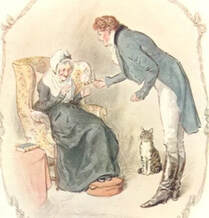 Acts of Kindness -- Frank Churchill mends Mrs. Bates's spectaclesAusten not sentimental
Acts of Kindness -- Frank Churchill mends Mrs. Bates's spectaclesAusten not sentimentalIn “Learning the Art of Charity,” in Jane Austen’s Philosophy of the Virtues, Sarah Emsley discusses Emma Woodhouse’s uncharitable rudeness toward Miss Bates, and her generous sharing of food with Miss Bates and her mother. Here, Emsley is defining “charity” broadly.
To be fair, though what charitable acts could Emsley reference in Austen's novels? There are few examples in her books to study. Are any of Austen's heroines shown as being charitable apart from Emma? We are told Marianne Dashwood becomes the patroness of the village after her marriage, but we aren't shown heroines in action. Does Anne Elliot take a boy run over by a horse into her carriage? Does Elinor Dashwood teach the lisping village children how to read? Does Elizabeth Bennet call in at the hovels of the poor on her walks to Meryton? No? Does this mean that there are no poor cottagers in Meryton, or does this mean the readers of the day assumed that Elizabeth helped the poor as a matter of course, or does it mean something else?
Not only are Austen's heroines not charitable, she mocks her female fools/villains who are charitable: One character who talks about helping the poor is, paradoxically, Mrs. Norris in Mansfield Park: “Why cannot you come and sit here, and employ yourself as we do? If you have no work of your own, I can supply you from the poor basket. There is all the new calico, that was bought last week, not touched yet. I am sure I almost broke my back by cutting it out. You should learn to think of other people...”
Another Lady Bountiful--Lady Catherine de Bourgh--is held up to ridicule: "whenever any of the cottagers were disposed to be quarrelsome, discontented, or too poor, she sallied forth into the village to settle their differences, silence their complaints, and scold them into harmony and plenty." No lisping or blessing tenants here!
Austen could even laugh at the suffering heroine who needs charity herself. In her 'Plan of a novel," a short satiric piece written the year before her death, she makes fun of sentimental novels by proposing a heroine "often reduced to support herself and her Father by her Talents and work for her Bread; continually cheated and defrauded of her hire, worn down to a Skeleton, and now and then starved to death."
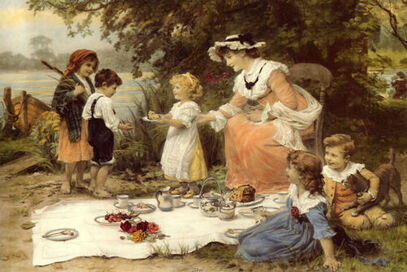 The Cheerful Giver, or Little Lady Bountiful, Frederic Morgan No Romantic Expectations
The Cheerful Giver, or Little Lady Bountiful, Frederic Morgan No Romantic Expectations The heroine Coraly, quoted in the previous post, says: “It is dreadful to my feelings…. to see the mixture of profusion and luxury, of want and misery, which in the same moment meet your eye in this town! Could but a little be spared from the one, and given to the other, how much would the picture be improved?”
Coraly's call for income redistribution goes much farther than Jane Austen ever did in condemning the luxuries of the rich and publicizing the sufferings of the poor. Nevertheless some scholars maintain that Austen was radical and progressive in her views. This theory is of recent origin. Leslie Stephen, a prominent Victorian-era critic, accused her of complacency: “She is absolutely at peace with her most comfortable world. She never even hints at a suspicion that squires and parsons of the English type are not an essential part of the order of things; if she touches upon poverty, the only reflection suggested is one of gentle scorn for people who can’t keep a butler themselves or take tea with people who do so. When the amiable Fanny Price in Mansfield Park finds that her mother has to eat cold mutton and mend the children’s clothes, her only thought is to return to her rich uncle. The harsh hideous facts with which ninety-nine out of a hundred of our fellow-creatures are constantly struggling, are never admitted into this delightful world of well-warmed country houses.”
I think that’s going too far the other way. I have my own theory about why Austen does not use charity as a topic. It is not about Austen’s personal convictions as a humanitarian, but her artistic choices. I think Austen, as a writer, felt her voice could not sing in a sentimental register. None of her heroines make a parade of their virtue. She rejected as a threadbare cliché the idea of presenting any of her heroines bestowing the tender smile of benevolence on the artless lisping urchins in their habitation of misfortune and want. Her remarks in Emma make it clear that she recoiled from the sentimental portrayals of the poor old cottagers blessing their benefactors. "Emma was very compassionate; and the distresses of the poor were as sure of relief from her personal attention and kindness, her counsel and her patience, as from her purse. She understood their ways, could allow for their ignorance and their temptations, had no romantic expectations of extraordinary virtue from those for whom education had done so little; entered into their troubles with ready sympathy, and always gave her assistance with as much intelligence as good-will." Austen's father was a clergyman, and her mother was a clergyman’s wife. It is impossible that she would not have heard, and participated in, discussions of poverty and the duties of Christians toward the poor. I think Austen's philosophy was summed up very well in in that brisk and unsentimental paragraph in Emma.In my earlier post on poverty, I also talked about the gypsies in Emma, who are not treated sympathetically, despite their poverty.
A reminder that during Austen’s lifetime, humanity began its steep climb into prosperity, in amazing contrast to the centuries of hardship that had preceded our modern era.
I believe that Austen read Albert, or the Wilds of Strathnavern, (quoted above) because one of its main characters appears to be a prototype of Persuasion's Admiral Croft, and it uses the device of private theatricals. More about that here.
In A Different Kind of Woman, the final volume of my Mansfield Trilogy, Fanny Price organizes a bazaar, a way for women to sell their wares without the expense of opening their own shops. For more about my writing,click here.
Emsley, Sarah. Jane Austen’s Philosophy of the Virtues. Palgrave Macmillan US, 2005
Stephen, Leslie, 'Humour', Cornhill Magazine 33 (1876), pp. 324–5.
Published on April 19, 2022 04:49
April 11, 2022
CMP#97 Charity in Country and Town
 "I have given a pr. of Worstead stockgs. to Mary Hutchins, Dame Kew, Mary Steevens & Dame Staples; a shift to Hannah Staples &a shawl to Betty Dawkins; amounting in all to about half a guinea." -- Jane Austen mentioning her charitable giving in a letter, Christmas 1798 CMP#97 Charity from Heroines and Heroes: "You're An Angel of Goodness!"
"I have given a pr. of Worstead stockgs. to Mary Hutchins, Dame Kew, Mary Steevens & Dame Staples; a shift to Hannah Staples &a shawl to Betty Dawkins; amounting in all to about half a guinea." -- Jane Austen mentioning her charitable giving in a letter, Christmas 1798 CMP#97 Charity from Heroines and Heroes: "You're An Angel of Goodness!"
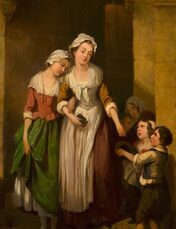 In an
earlier post
, I wrote about charity in Austen’s time and discussed some references to charity in Austen’s novels. Since then, I’ve come across a lot of examples of heroines (and some heroes) performing acts of charity in the novels of the long 18th century. It seems that showing the heroine being charitable was a sure-fire way for the author to establish her virtue and sweetness.
In an
earlier post
, I wrote about charity in Austen’s time and discussed some references to charity in Austen’s novels. Since then, I’ve come across a lot of examples of heroines (and some heroes) performing acts of charity in the novels of the long 18th century. It seems that showing the heroine being charitable was a sure-fire way for the author to establish her virtue and sweetness.Emma quietly exults within when she and Harriet encounter Mr. Elton on their way back from a mission of charity to a poor cottager in Emma. She knows from novels that the hero is always rapt with admiration when he sees the heroine under these circumstances: “To fall in with each other on such an errand as this,” thought Emma; “to meet in a charitable scheme; this will bring a great increase of love on each side. I should not wonder if it were to bring on the declaration.” It didn't work with Mr. Elton, of course, but we can find some men who are won over by the heroine's benevolence, such as the heroes in Coelebs in Search of a Wife, Madame Panache, and Coraly.
While visiting her mother in Scotland, Adela in Traits of Nature (1812) visits "one or two of the neighbouring cottages, enquiring... into the circumstances of their inhabitants. Adela was chief interrogator on these occasions; she loved the simple and industrious poor; and never addressed herself to any of that description, without the most manifest signs of regard, interest, and sometimes, even respect.”
In the Mystic Cottager of Chamouny (1795) Lady Mentoria is a mentor to young Rosalie, taking her on a tour of the local cottagers, who she encourages in habits of thrift, industry and piety: "these my dear girl," she tells Rosalie, "are the real and only useful plans of relief to the indigent..."
In the The Woman of Letters (1783), the heroine empties her meagre purse to help “a woman of the town” who turns out to be her once-haughty cousin. “Oh! (said she bursting into tears) you are an angel of goodness! Assist such a wretch as me indeed!”
In this post and the next, we'll look at charity in city and town, the way poor people were portrayed in novels, and the role of parish officials in doling out charity. We'll see how heroines, who otherwise led very constrained lives, were able to exert agency in their charitable deeds.
Finally, we'll ask: if charity is mentioned in so many novels of this period, particularly in relation to heroines, why do we read so little about charity in Austen's novels?
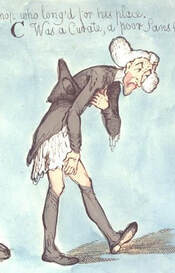 The poor curate, "sans culottes" Encountering Real Suffering
The poor curate, "sans culottes" Encountering Real Suffering The frequent references to severe poverty and distress in novels of this period remind us that Regency people saw human suffering at first-hand, suffering that we might only see while watching the television news about a famine in some distant part of the world.
Even an apple orchard was a temptation. In Persuasion, a laborer breaks down a wall to steal apples from a curate’s orchard. Compare that to the prosperity of today. In the Okanagan Valley where I live, apples fell off the trees during the Covid pandemic, because farmers could not bring in the usual Mexican or Jamaican labor to pick the apples, and almost no Canadians are willing to do the work.
In Matilda Mortimer (1810), a novel for young people, the heroine sees a hungry girl in rags: “One day, as she was walking in an adjacent village, a little girl, sickly in appearance and half naked, ran after Matilda, sobbing, and begged her for God’s sake to give her a half-penny, for her mother was sick, and had not a morsel of bread to give her. Matilda happened only to have a shilling in her purse, which she gave the little girl.”
Mrs. Williams in The Advantages of Education (1793) visits a poor family whose breadwinner has died: “The scene that I beheld, was truly deplorable; the corpse of the father, covered with an old sack, was laid on the ground, in the least frequented corner of a miserable cottage. On a bed that mocks description, lay the eldest girl, to all appearance expiring with the same dreadful disease, and a boy recently seized with its symptoms; a truss of straw, then unoccupied was, I found, the nightly residence of two half-naked children, who were sufficiently recovered to crawl to the green wood that lay smothering in the chimney, and constituted what was called a fire. The mother of these unhappy creatures, feeble through fatigue, and emaciated by famine, with one arm held to her exhausted breast a little infant…”
Are these authors exaggerating for dramatic effect? Historian Rory Muir quotes the journal of Sydney Smith, who as a young curate was assigned to a small parish where two-thirds of the families struggled. Smith wrote of children bare-legged and barefoot in winter. ‘John Head has a wife and four children... a wretched family, neither sheet or blanket, and only a miserable straw bed for the children. Only straw to burn and very little of that…’ Smith himself was paid a paltry 50 pounds a year, hardly enough to support himself.
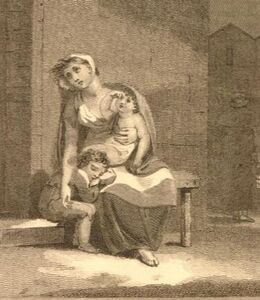 Every-day sight: Homeless mother and children, Henry Corbould, British Museum The Deserving Poor and the Undeserving
Every-day sight: Homeless mother and children, Henry Corbould, British Museum The Deserving Poor and the UndeservingWhen heroines in novels help the poor, the author usually assures the reader that these poor people are deserving of charity—they have not brought their troubles on themselves.
In Maria Edgeworth's Belinda (1801) the heroine goes to visit "an old man and woman, who had for many years been industrious tenants, but who, in their old age, had been reduced to poverty, not by imprudence, but by misfortune.”
In Husband Hunters (1816), three unmarried sisters live together in the family home. “Emily consigned one hundred a-year for board, so that she had one hundred and fifty more at her own disposal. The odd fifty she devoted to benevolent purposes, and she found it enough, as an individual, for her circle of poor. Sorry was she to find that misery and extreme want scarce ever presented themselves but in consequence of idleness and vice. These she left to parochial aid and the pity of the churchwardens, content to succour those more deserving of her assistance."
Emily "[sought] to distinguish real wants from those brought on by laziness and sloth. It was well known amongst them that she never bestowed her money on the idle or the dirty; consequently, self-interest made many diligent, cleanly, and quiet…”
There are some exceptions. In Stratagems Defeated (1811), the wealthy and benevolent young hero gives fifty pounds to a young man whose father is about to be imprisoned for debt. He later learns that the young man rushed off and bought himself a new suit of clothes and hired a gig to drive around town, instead of helping his father. The hero's uncle advises him: "It is not your fault if your bounty has been ill bestowed; indeed it is a much easier task to relieve, than to reform mankind; the first it is the duty of us all to do, the latter we can only do by setting our inferiors a good example."
Likewise, Lady Forester in The Spiritual Quixote (1773) persists with her daily morning calls of charity to the poor of her village, even though one recipient complains her gift of baby-linen is coarse, another complains that the broth doesn't have meat in it, and an old man tells her the medicine she mixed for him tastes bitter. Lady Forester concludes that she "was sufficiently rewarded, in the consciousness of having discharged her duty."
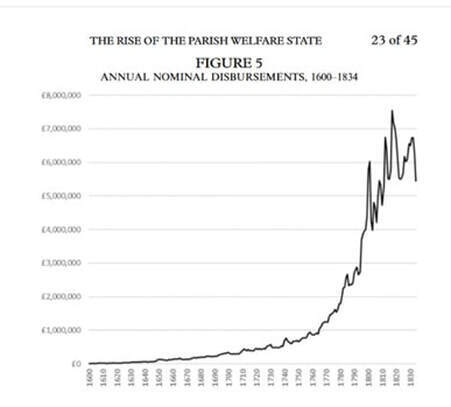 Dr. Brodie Waddell, "England's parish relief system redistributed a vast amount of resources from the wealthy to the poor." Private Charity and Parish Charity
Dr. Brodie Waddell, "England's parish relief system redistributed a vast amount of resources from the wealthy to the poor." Private Charity and Parish CharityIndividual parishes controlled who received relief rom the poor-rates. In The Rotchfords (1786), an exchange between father and son sheds light on how charity at the village level was dispensed or withheld: “As I was walking down the lane this morning before breakfast," [says young Charles] "I met Bob Swift… crying most piteously, and gathering sticks for his mother. He begged me to give him an halfpenny… I recollected that you positively ordered none of us to give more to the Swifts, because they have been extremely wicked, and ungrateful.”
The father explains that “John Swift has not less than three different times, by contributions amongst the gentlemen of the parish, been set up in such ways, as with any degree of industry he might have maintained himself and his family with comfort and ease; but... he will spend his time at the ale-house, and with insolent ingratitude, abuse and break the windows of those who have assisted him because they will not give enough to maintain his idleness…” In addition, “his wife and children are so frequently found not only breaking down [fences for fire-wood], but also robbing hen-roosts, and taking anything they can carry off undiscovered, from the very houses to which they have been admitted to receive relief… the industrious and the honest, ought to be relieved before them; and whilst there is a virtuous poor person to be found who stands in need of assistance, the Swifts should go without, till the more deserving are supplied.” Mrs. Williams is more charitable In the Advantages of Education. She orders food and fuel for the starving family whose father has died, (mentioned in a previous section) “but anxious to procure them a permanent relief, I represented their distress to the parish officers, who had refused them any assistance. The man had been dissolute and unworthy, and seemed, by idleness and insolence, to deserve affliction. Against the woman they allege nothing, and her neighbours assure me, she has been humble and diligent.” The mother pleads for help for the “unoffending family.”
Self-respecting poor people were also shown as dreading the idea of asking for alms. Mrs. Williams admires the industry of Nelly Waters who lives across the road who “you know we have observed that at whatever time we arose, or went to bed, we saw a light in that house, and heard her singing at her wheel.” Mrs. Williams investigates and learns that Nelly labours “these extraordinary hours” to support her ailing grandmother. “The old woman dreads the idea of receiving subsistence from the parish; and... [Nelly] has refused an offer of marriage from a young man whom she tenderly loved, that she might dedicate herself, during her grandmother’s life, to the discharge of a double portion of labour, in order to support her.”
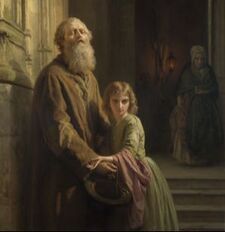 The Blind Beggar (detail) Charity in the City
The Blind Beggar (detail) Charity in the CityIn a small village, a heroine could learn the needs and faults of the villagers. Before she leaves for the wicked city, the heroine of Celia in Search of a Husband (1809), visits all the villagers to say good-bye. Old Godfrey, "whose nourishment had often been conveyed by her hands, wept in despair."
But knowing how to dispense charity was a different matter in London. Generous people could be accosted by unknown beggars in larger population centers.
In Coraly (1819) the heroine relies upon her own intuition when she helps a poor man with a little child begging in the park, over the objections of her cousin Emmeline. "‘Cousin Coraly, what can you possibly mean by talking to such people? You must do not do here as you do in the country... You are liable to impositions of all kinds! You will be followed by a herd of beggars. You may catch all sorts of complaints; and it is ten to one but this very creature is an imposter.’
“Coraly, disgusted, answered, not very good-humouredly, ‘I hope to God he is an imposter; I wish no such misery may be in existence, as he tells me is his and his family’s.’
After Coraly visits the man's home and enquires into their circumstances, she “perceived the feeling the child had roused in her breast had not been a mistaken one, for she found a distressed but worthy poor family, thrown into affliction by real misfortune.” She pays the family’s debts and loans them money to start a business. "Teach a Man to Fish"
Heroes and heroines, just like their real-life counterparts, knew the value of “teaching a man to fish.” Historian Rory Muir recounts that the real-life curate Sydney Smith "established a Sunday school and was delighted with the regularity and diligence of the pupils. Encouraged by this success, the curate and his patron went on to establish a School of Industry for poor girls which taught them darning, sewing, knitting and spinning, as well as distributing charity directly to poor families. The villagers remained desperately poor, but their plight was not quite as hopeless as it had been before."
The heroine of Consequences; or Adventures at Rraxall Castle (1796) volunteers to teach the village children to read. The hero in The Denial (1792) helps out a woman begging on the roadside with her little children: “I have determined to set her up in a shop, by which she may be enabled to provide for herself and little ones. Should she succeed, I shall at least enjoy the happiness of reflecting, that I have administered consolation to the wretched, mitigated the pang of misery, and given the means of support to hunger and despair.”
So, why don’t we see scenes like this in Austen? Why aren't her heroines more charitable? Next post. Rory Muir. Gentlemen of Uncertain Fortune: How Younger Sons Made Their Way in Jane Austen's England. United Kingdom, Yale University Press, 2019.
Brodie Waddell, "The Rise of the Parish Welfare State in England, C.1600–1800*," Past & Present, Volume 253, Issue 1, November 2021, Pages 151–194,
Published on April 11, 2022 00:00



